- Home
- Ann M. Martin
Kristy and the Secret of Susan Page 7
Kristy and the Secret of Susan Read online
Page 7
Except for Mel. “What happened?” he asked Gina.
“She,” said Gina angrily, pointing at me, “got mad. I want my dollar back.”
“Your dollar back!” I said with a gasp.
“Yeah! Mel’s charging us a buck apiece to go inside and see the incredible retard who can memorize dates and music. The amazing dumbo who can sing but not talk,” said Gina.
My jaw dropped.
Mel Tucker had a real sideshow going. He thought he’d found an even better attraction than the stupid chicken he’d once seen playing a piano.
“You,” I said, advancing on Mel — and I can look pretty menacing, even though I’m short. (Several children ran away.) “Do you know what you’re doing? You’re using Susan. You’re making a spectacle of her.” I turned to the rest of the kids. “And I don’t ever want to hear any of you use the words ‘retard’ or ‘dumbo’ again. Do you hear me?”
“Yes,” murmured the few children who hadn’t already run off. “And as for that money, Mel, half of it — at least half of it, belongs to Susan. She did all the hard work. So fork over,” I ordered him.
But of course he didn’t. Mel and the remaining kids ran down the street. When they were about half a block away, they began to laugh. How can people be so insensitive?
And how could I have been so naive? How could I have thought those kids suddenly wanted to be Susan’s friend? I should have seen through them. At least Susan couldn’t see through them. I was glad she didn’t know what was going on.
I needed to cool off.
So I led Susan over to the Hobarts’, where I knew Claud was baby-sitting.
While I was dealing with Mel Tucker and the other neighborhood kids, Claudia was sitting for the three younger Hobart boys. No wonder James hadn’t come over to play with Susan. He’d been busy trying to prove that he was neither a Croc nor a wimp….
Claudia’s afternoon started with Johnny’s tears. As soon as Johnny realized that his mother was going to leave him with someone he barely knew, he began to cry.
“Don’t go!” he wailed.
“Johnny,” said Mrs. Hobart gently, as Claudia stood in the front hall of Mary Anne’s old house, trying to look as nonthreatening as possible, “your brothers are going to be here with you. Mathew and James are here.”
Johnny stood on tiptoe and tugged at his mother’s shirt. Mrs. Hobart bent down so Johnny could whisper to her. She listened for a moment. Then she smiled and said, “No. I promise that Claudia will not call you a Croc.”
“I promise, too,” said Claudia. “I’ll only call you Johnny.”
“What do I call you?” Johnny asked Claudia, holding his mother’s hand.
“You can call me Claudia or Claud — or whatever you want. Gabbie Perkins next door sometimes calls me Claudee Kishi. She likes to call people by their first and last names.”
Mrs. Hobart smiled at Claudia, and Claudia smiled back. She thought how similar the Hobarts looked, with their reddish-blond hair, their round faces, and the smattering of freckles across their noses. Even Mrs. Hobart had freckles. Claudia hadn’t seen Mr. Hobart close up, though, so she didn’t know whether he had freckles.
“All right, Johnny, I have to leave now,” said Mrs. Hobart.
“No!” squawked Johnny.
“Mathew! James!” called Mrs. Hobart. “Can you please come here?”
The boys clattered down the stairs.
“I’m leaving now,” their mother told them. “Please give Claudia some help with Johnny. Oh, and Johnny, you can help Claudia, too. I don’t think she knows where the telly is. Or maybe you’d like to offer her a lolly.”
“Lollies? We can have lollies?” asked Johnny.
“Yes. If you’ll let go of my hand.”
Johnny let go. He made a dash for the kitchen, and Claudia said good-bye to Mrs. Hobart. “Everything will be fine,” she assured her. “Don’t worry.”
The Hobart boys and Claudia each helped themselves to a lolly. (No way was Claudia going to turn down an offer of junk food.) Then Mathew said, “Let’s watch the telly. I like Big Bird and Oscar the Grouch.”
“Me, too,” agreed Claudia, “but do you really want to stay inside on such a nice day?”
“I do,” spoke up Johnny, who was already a sticky mess.
“He doesn’t want to be called a Croc,” said Mathew.
“Do the kids still call you Crocs?” asked Claudia.
“Yes, but not as much,” admitted James.
“Then let’s go out to your backyard,” said Claudia. “Johnny, you can bring your new truck out. We’ll have fun. Honest.” She gave Johnny’s hands and face a wipe with a wet cloth.
“We’re going out,” said James, speaking for himself and Mathew.
“Then I’ll come, too,” Johnny said finally.
So Claudia and the Hobarts ventured outside, Johnny clutching his truck.
The boys played peacefully for twenty minutes. Johnny steered the truck around the yard, making sound effects as he went. James and Mathew played on a swing that their father had made for them. It was a huge tire suspended from a tree branch by a thick rope. The boys could stand on the tire and swing back and forth together.
“Awesome!” yelled James as he and Mathew swung higher and higher.
“Slow down!” was Claudia’s horrified reply. Ever since she was little she had heard that it was possible to swing so high you went right over the top of the swing set or the tree branch, making a complete circle. She had never known if that was true, but she didn’t want to find out while she was baby-sitting and have to explain to the Hobarts that their sons had done a three-sixty on the tire.
“Yeah, slow down,” echoed a voice.
Claudia turned around.
Johnny brought his truck to a stop.
And James and Mathew jumped off the swing.
Zach Wolfson had entered the Hobarts’ yard. Claudia didn’t know it, but he had come straight from the Felders’ house, where he had paid Mel a dollar to ask Susan the three dates. (I realized later that Zach had not been among the kids hanging around Mel when I had charged out of Susan’s house after Gina.)
“Pay attention to your baby-sitter … you babies,” teased Zach.
“We are not babies,” replied James hotly.
“Yes you are.”
“No we’re not.”
“Yes you are.”
“Well, I’m not,” said James. “I’m even in advanced maths in my new school.”
“Advanced maths? Maths? You can’t even say the word right.”
“What word?”
“Math. It’s math, not maths…. James, can you say math?”
James didn’t miss a beat. “Zach, can you say How would you like your head bashed in?”
“Sure,” replied Zach. “How would you like your head bashed in?”
James had fallen into his own trap.
He turned and marched out of the backyard. When he came back, he was carrying an old wooden crate and a boxing glove. He set the box on the ground near Zach.
“Watch this,” said James. He put the glove on and smashed his fist clear through the top of the crate, almost to the ground.
Claudia knew better than to ask James if he was okay. She knew that he and Zach had to have this out (whatever it was) between themselves and on their own terms.
Zach’s eyes widened. “Whoa,” he said. “What was that? Crocodile Dundee stuff?”
“No,” replied James.
“Karate?” asked Zach.
“No. I’m just strong. Very strong. Think how you’d look if that crate had been your face.”
Zach winced. Then he backed away. He looked a little frightened.
But James said, “I could teach you to do that.”
“You could?”
“Sure. All you need are big muscles. Do you have big muscles?”
“Well … well, maybe I would if I worked out….”
James nodded knowingly. Zach was a bully, but probably not a bad
kid.
“You want to go bike-riding sometime?” Zach asked James.
“Yeah! That would be ra — that would be great. Or how about skateboarding? Do you have a skateboard?”
“Of course.”
“We could go skateboarding now,” said James. “You could borrow my brother Ben’s if you don’t want to go home for yours. He’d let you. He’s awfully nice about things like that.”
It was at this point that I stormed into the Hobarts’ backyard with Susan in tow. I fully expected James to run to Susan — his mate. Instead he waved, but turned back to Zach.
“Hello, everyone!” I called.
“Hi,” replied Claudia and the boys.
“Here’s Susan,” I announced needlessly.
“Hullo, Susan,” called James.
“Claud,” I said, “I have to talk to you.” Then I added, “James, can you play with Susan while I talk to Claud?”
“Can — can Susan skateboard?” asked James doubtfully.
“I don’t think so,” I replied.
“Oh. Zach and I were going to go skateboarding.” James looked quite pleased to be able to say “Zach and I” as if Zach were a celebrity. He also looked hesitant. I could tell he didn’t want to hurt Susan or disappoint me.
“Hey, that’s okay,” I said. “You guys go on. Susan will be fine with Claudia and me.”
Johnny went back to his truck, Mathew went back to the swing, and Claud and I sat on the stoop. Susan stood nearby. She refused to sit down for some reason.
“So you know what that Mel Tucker was doing?” I said indignantly as I finished telling Claud about the afternoon’s events.
Claudia leaned forward. “What?”
“He was charging the kids around here a dollar to go into the Felders’ house and either ask Susan dates or get her to memorize a new piece of music. It was like she was a freak or something. Mel was calling her ‘the retard who can memorize dates and music’ and ‘the dumbo who can sing but not talk.’”
“That’s — that’s terrible!” cried Claud. Then she lowered her voice. “Are you sure you should say that in front of Susan?”
I looked over at Susan, who was standing exactly where I had left her. As usual, her hands were flapping away. She was staring at the sky, weaving her head from side to side.
“You know, I really don’t think she hears us. I don’t think she knows who we are. I don’t think she even knows where she is. Worse, I don’t think any of that matters to her.”
Claud’s eyes filled with tears. So did mine.
“Where does she fit in?” I asked.
“Maybe not here,” replied Claud sadly. “Maybe not with ‘regular’ kids.”
Susan and I spent the rest of the afternoon at the Hobarts’. James and Zach played the time away. Zach never asked Susan to join him, but he called “hullo” to her every now and then.
James had found the kind of friend he needed. The friend was Zach.
There have been very few jobs in the history of the Baby-sitters Club that I really did not want to go on, and today’s job was one of them. Oh, sure, there have been times when I didn’t look forward to sitting for Jenny Prezzioso, or when I wondered what I’d be getting into when I signed up to sit for Jackie Rodowsky, the walking disaster.
But today was different.
Today was my last day at the Felders’, and Susan’s mother needed me not so much to baby-sit as to help pack Susan’s trunk for her new school. This was a bigger job than it sounded. You might think that all Mrs. Felder would have to do was fold up Susan’s clothes, put them in the trunk, and throw in a stuffed animal or two. It wouldn’t be like packing for Karen, my stepsister, who would want to bring along books, games, toys, her roller skates, and a lot of other things.
But it was a big job. The school had sent the Felders a list (a long one) of the belongings a new student was to bring, and each item had to be labeled with Susan’s name. Plus, Mrs. Felder insisted on washing and ironing everything first. I guess she wanted to make a good impression.
The washing and ironing and labeling were not what I disliked, however. What I disliked was that we had to pack Susan’s trunk at all.
I had failed in my mission to keep Susan at home, where I thought she belonged. But I did not mention this to Mrs. Felder.
Anyway, I arrived at Susan’s house at three-thirty, and Mrs. Felder greeted me with a smile and an armload of freshly washed and ironed clothes.
“Hi,” she said. “Come on inside.”
In the background I could hear Susan singing, “I love you madly, madly, Madame Librarian, Marian,” and accompanying herself on the piano. Mrs. Felder and I left her alone. As long as we could hear the piano, we knew she was safe.
We carried the pile of clothes to Susan’s bedroom, where a steamer trunk was open on the floor.
“Okay,” said Mrs. Felder. “There’s the checklist from the school.” She pointed to a piece of paper lying on Susan’s bed. “The items I’ve checked off have been washed, ironed, folded, labeled, and packed. I don’t check anything off until all five things have been done. That way, I know I’ll send Susan off in good —” Mrs. Felder paused, and her eyes looked awfully bright. I could tell she was trying not to cry, and I hoped she wouldn’t. (I never know what to do when an adult cries, especially an adult I don’t know very well.) “Off in good shape,” Mrs. Felder finished, apparently getting control of herself.
I guessed that sending Susan away again wasn’t easy for Mrs. Felder. There were times when I thought that packing her off was the Felders’ idea of the easy way out. But Susan was their only child. It couldn’t be easy to let her go.
“Can you sew?” Mrs. Felder asked me.
“A little,” I replied. (I hate sewing, but I can do it if I have to.)
“Good. These clean clothes in the basket need Susan’s name tags sewn inside them. The job goes faster than you’d think.”
“Okay,” I replied, as Mrs. Felder handed me a threaded needle and then threaded one for herself.
We settled into our work. At first we didn’t talk. The sounds of “Gary, Indiana,” another song from The Music Man, floated upstairs.
“Today Susan is playing the score from the movie,” Mrs. Felder informed me. “She’s playing the songs in the order in which they’re played on our record.”
I nodded. Then, from out of the blue, I asked, “What was Susan like when she was little?” I think I asked because I was looking around her room and it reminded me of a hotel room — no personality. No indication of what kind of person the room belonged to. There were no posters on the walls, no books, and very few toys, because Susan didn’t care about such things.
That was sad. Even my littlest sister, Emily Michelle, who is only two and barely talking, has much more of a personality than Susan. We know her. Emily already has strong likes and dislikes. As soon as she came to stay with us she developed a fascination with teddy bears. So there are bears all over her room, and pictures of teddies on her walls. She likes balloons, too, so we got her a lamp that’s shaped like a bear holding a bunch of balloons, and someone made her a mobile of bears and balloons, and Nannie is knitting a sweater for her with bears and balloons on it.
There are no secrets with Emily. Not like Susan, who is all locked up and so secretive we don’t know her.
“When Susan was little?” Mrs. Felder repeated. “You mean when she was a baby? Or when she was a toddler?”
“Both, I guess,” I replied. I knotted a thread, cut it off, folded one of Susan’s shirts, name tag in place, placed the shirt in the trunk, and put a mark on the checklist.
“Well,” Mrs. Felder began, looking faraway, “I know this sounds silly — I guess every mother says it, or at least thinks it about her own child — but when Susan was born, my husband and I agreed that she was the most beautiful baby we’d ever seen. We thought she was perfect. She wasn’t all scrunchy and red-faced and bald like the other babies in the nursery.” (I smiled.) “She was born with cu
rly dark hair, and she had wide eyes with long lashes and her face was just, well, perfect.”
“She is beautiful,” I broke in.
“Thank you,” said Mrs. Felder. Then she went on, “Her father and I counted her fingers and toes and exclaimed over her tiny, tiny nails — just like all the other new parents were doing with their babies.
“Anyway, we brought Susan home and she was so alert. Our pediatrician assured us she was very advanced. She did everything early. Held her head up early, sat early, crawled early, walked early, talked early. She was speaking in sentences before we knew it. She even taught herself to read. Mr. Felder and I thought we had a genius on our hands. We looked into progressive schools for Susan and dreamed of the great future we were sure she’d have. We put money away so she could go to the best possible college someday…. We never imagined we’d be spending that money on the school she’s going to now.” (I felt a lump rise in my throat and hoped I wouldn’t cry.) “But then,” said Mrs. Felder, “when Susan was two and a half, she just — just shut down. She stopped speaking, stopped playing, even started wetting her pants, and she’d been toilet-trained for over six months. The pediatrician said it was the ‘terrible twos,’ but it soon became clear that that wasn’t the problem at all. This was when I taught her to play the piano. It was the only way I could reach her. And it was a way to be near her, since she wouldn’t let anyone touch her or hold her anymore. Apart from the piano, she became fascinated with the oddest things, like little pieces of paper that she’d wave in front of her eyes. When she found her father’s perpetual calendar we let her be fascinated with that because it seemed more … normal. It seemed smart, not like hand-flapping or paper-twirling. But soon it became an obsession, like the piano. That was how she learned the years and dates.
“By the time Susan was three and a half, we’d lost her completely. She’s pretty much now the way she was then, except that she’s toilet-trained again, for the most part, and can dress herself and feed herself, with a lot of prompting.”
Wow. I hadn’t expected to hear all of that. I was trying to think of what to say to Mrs. Felder when the piano-playing stopped.
“I’ll go check on her,” I said.

 Karen's Tea Party
Karen's Tea Party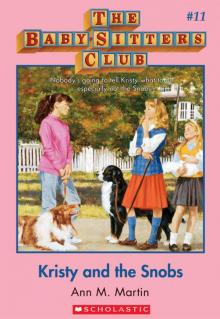 Kristy and the Snobs
Kristy and the Snobs Best Kept Secret
Best Kept Secret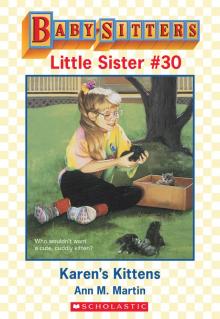 Karen's Kittens
Karen's Kittens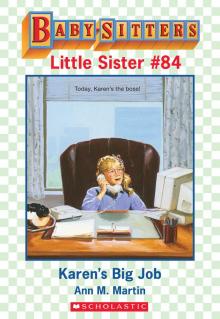 Karen's Big Job
Karen's Big Job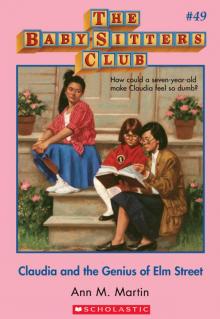 Claudia and the Genius of Elm Street
Claudia and the Genius of Elm Street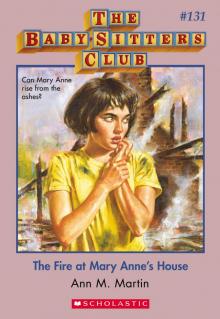 The Fire at Mary Anne's House
The Fire at Mary Anne's House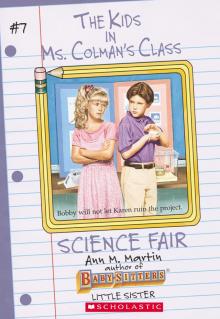 Science Fair
Science Fair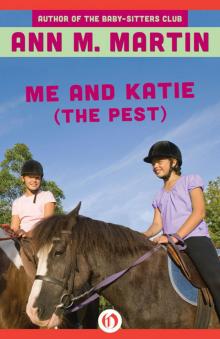 Me and Katie (The Pest)
Me and Katie (The Pest)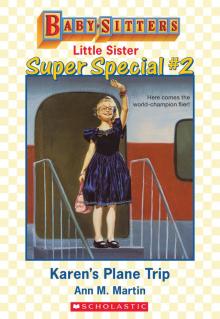 Karen's Plane Trip
Karen's Plane Trip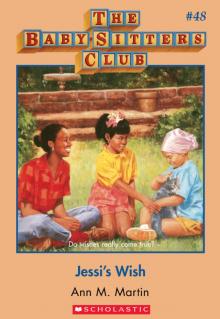 Jessi's Wish
Jessi's Wish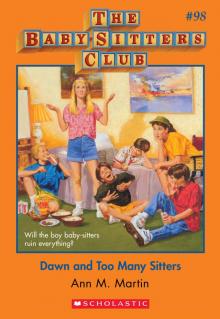 Dawn and Too Many Sitters
Dawn and Too Many Sitters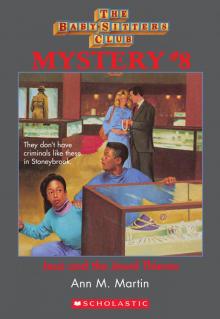 Jessi and the Jewel Thieves
Jessi and the Jewel Thieves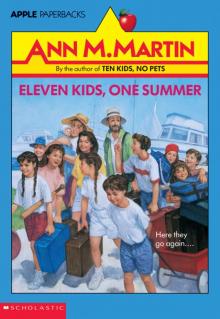 Eleven Kids, One Summer
Eleven Kids, One Summer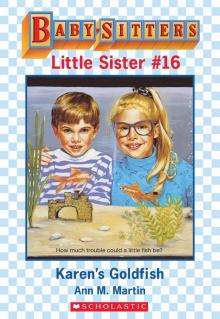 Karen's Goldfish
Karen's Goldfish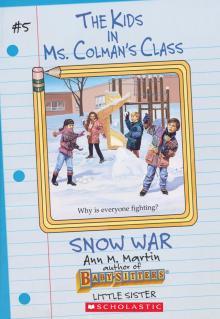 Snow War
Snow War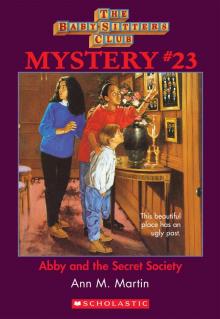 Abby and the Secret Society
Abby and the Secret Society Keeping Secrets
Keeping Secrets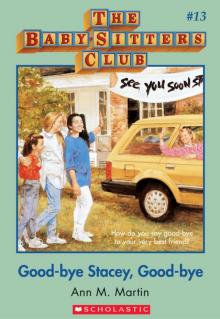 Good-Bye Stacey, Good-Bye
Good-Bye Stacey, Good-Bye Karen's Sleepover
Karen's Sleepover Claudia and the World's Cutest Baby
Claudia and the World's Cutest Baby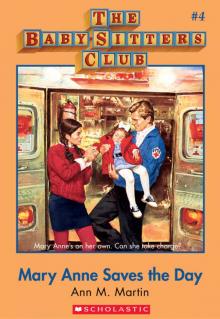 Mary Anne Saves the Day
Mary Anne Saves the Day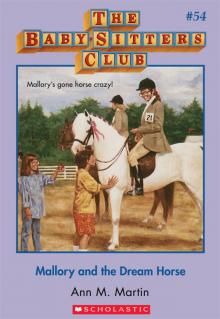 Mallory and the Dream Horse
Mallory and the Dream Horse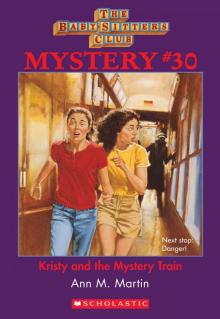 Kristy and the Mystery Train
Kristy and the Mystery Train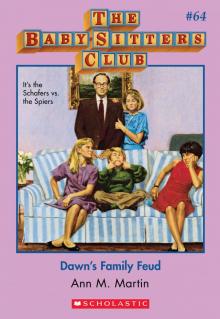 Dawn's Family Feud
Dawn's Family Feud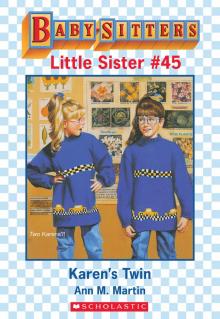 Karen's Twin
Karen's Twin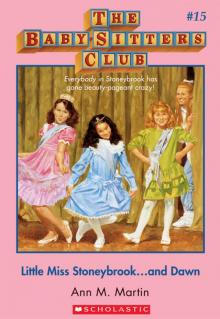 Little Miss Stoneybrook... And Dawn
Little Miss Stoneybrook... And Dawn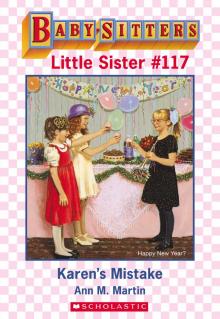 Karen's Mistake
Karen's Mistake Karen's Movie Star
Karen's Movie Star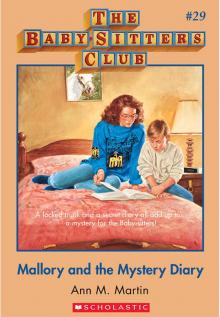 Mallory and the Mystery Diary
Mallory and the Mystery Diary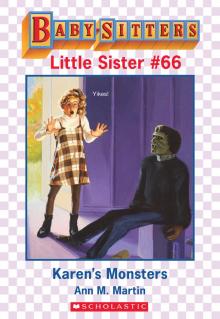 Karen's Monsters
Karen's Monsters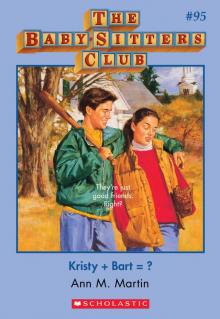 Kristy + Bart = ?
Kristy + Bart = ?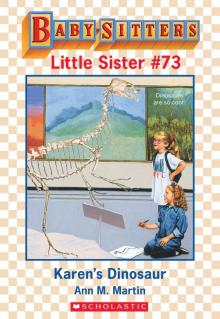 Karen's Dinosaur
Karen's Dinosaur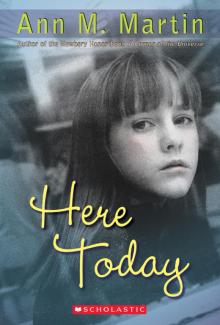 Here Today
Here Today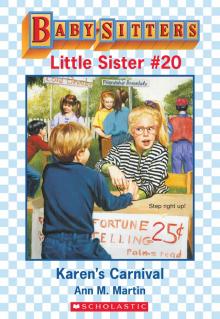 Karen's Carnival
Karen's Carnival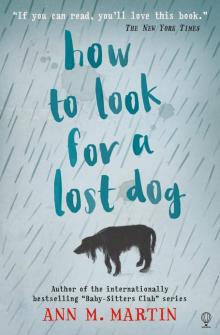 How to Look for a Lost Dog
How to Look for a Lost Dog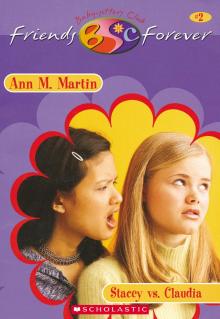 Stacey vs. Claudia
Stacey vs. Claudia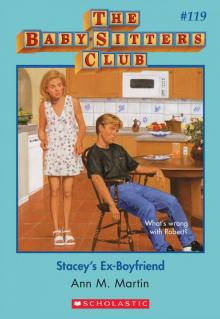 Stacey's Ex-Boyfriend
Stacey's Ex-Boyfriend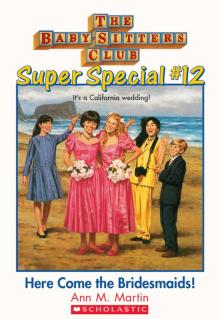 Here Come the Bridesmaids!
Here Come the Bridesmaids! Graduation Day
Graduation Day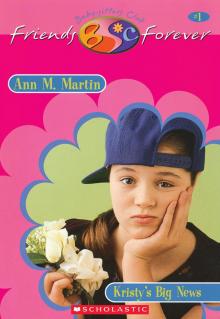 Kristy's Big News
Kristy's Big News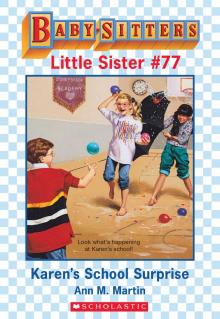 Karen's School Surprise
Karen's School Surprise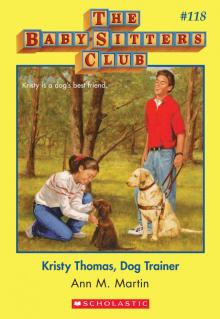 Kristy Thomas, Dog Trainer
Kristy Thomas, Dog Trainer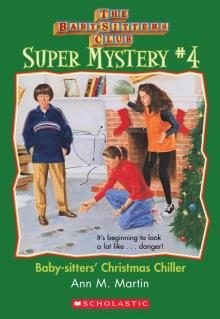 Baby-Sitters' Christmas Chiller
Baby-Sitters' Christmas Chiller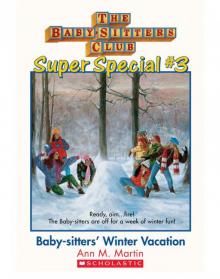 Baby-Sitters' Winter Vacation
Baby-Sitters' Winter Vacation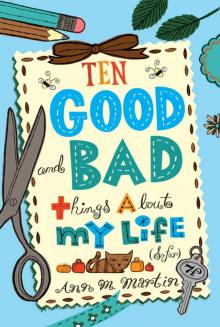 Ten Good and Bad Things About My Life
Ten Good and Bad Things About My Life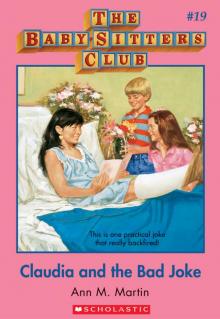 Claudia and the Bad Joke
Claudia and the Bad Joke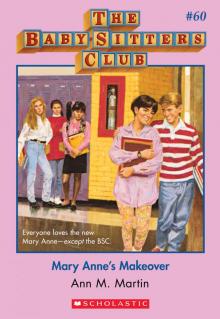 Mary Anne's Makeover
Mary Anne's Makeover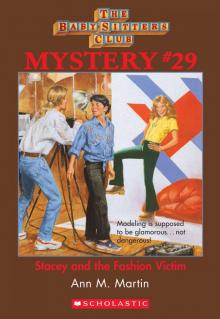 Stacey and the Fashion Victim
Stacey and the Fashion Victim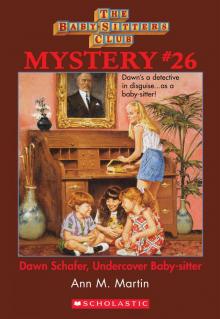 Dawn Schafer, Undercover Baby-Sitter
Dawn Schafer, Undercover Baby-Sitter Karen's Tuba
Karen's Tuba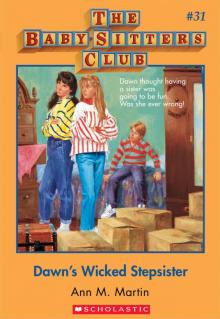 Dawn's Wicked Stepsister
Dawn's Wicked Stepsister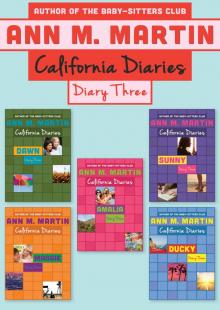 Diary Three: Dawn, Sunny, Maggie, Amalia, and Ducky
Diary Three: Dawn, Sunny, Maggie, Amalia, and Ducky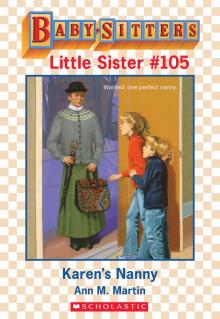 Karen's Nanny
Karen's Nanny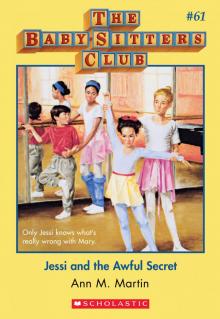 Jessi and the Awful Secret
Jessi and the Awful Secret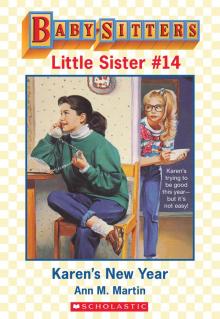 Karen's New Year
Karen's New Year Karen's Candy
Karen's Candy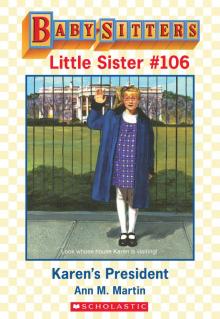 Karen's President
Karen's President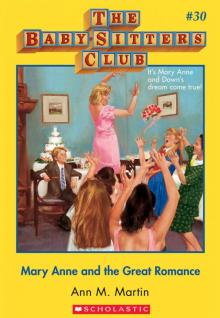 Mary Anne and the Great Romance
Mary Anne and the Great Romance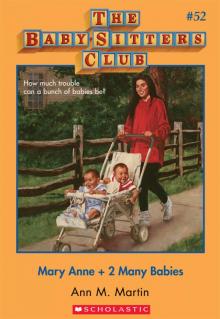 Mary Anne + 2 Many Babies
Mary Anne + 2 Many Babies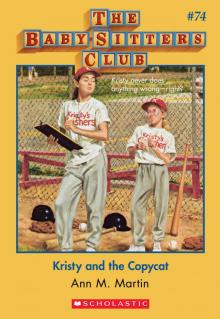 Kristy and the Copycat
Kristy and the Copycat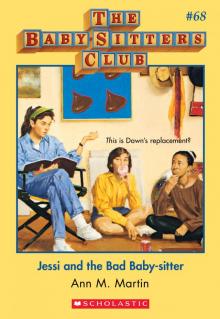 Jessi and the Bad Baby-Sitter
Jessi and the Bad Baby-Sitter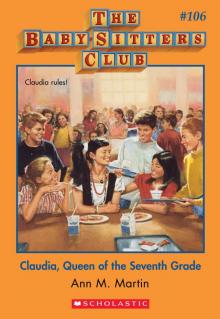 Claudia, Queen of the Seventh Grade
Claudia, Queen of the Seventh Grade Claudia and the Lighthouse Ghost
Claudia and the Lighthouse Ghost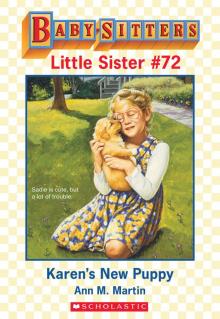 Karen's New Puppy
Karen's New Puppy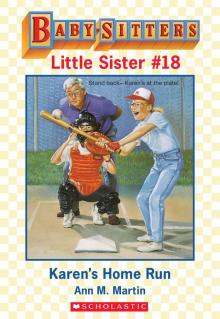 Karen's Home Run
Karen's Home Run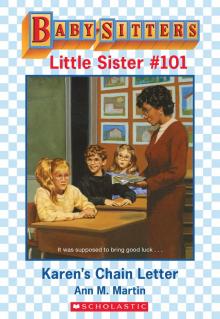 Karen's Chain Letter
Karen's Chain Letter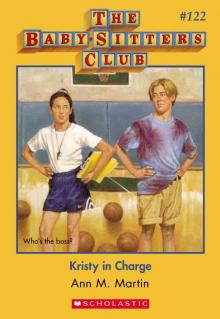 Kristy in Charge
Kristy in Charge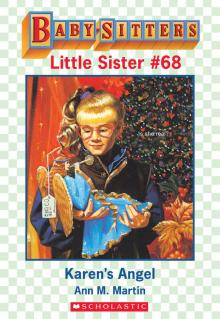 Karen's Angel
Karen's Angel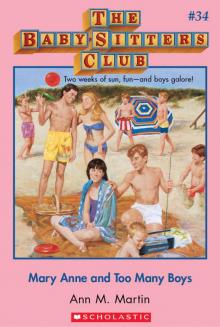 Mary Anne and Too Many Boys
Mary Anne and Too Many Boys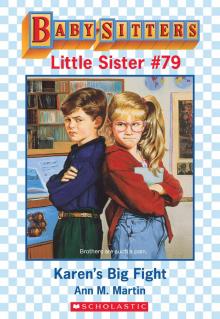 Karen's Big Fight
Karen's Big Fight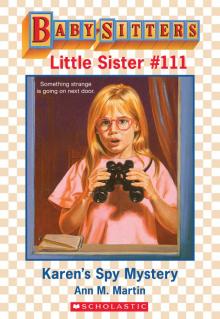 Karen's Spy Mystery
Karen's Spy Mystery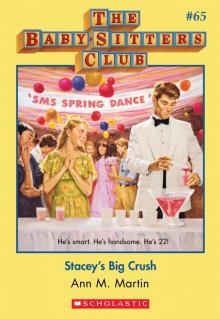 Stacey's Big Crush
Stacey's Big Crush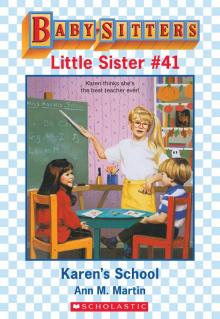 Karen's School
Karen's School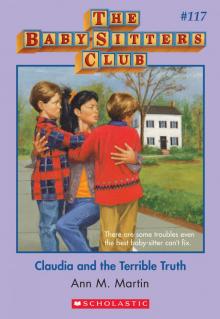 Claudia and the Terrible Truth
Claudia and the Terrible Truth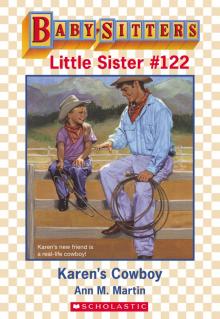 Karen's Cowboy
Karen's Cowboy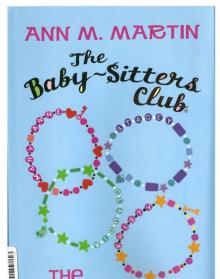 The Summer Before
The Summer Before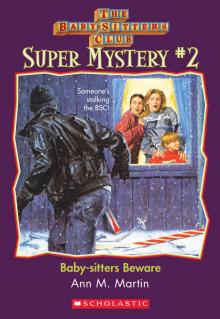 Beware, Dawn!
Beware, Dawn! Belle Teale
Belle Teale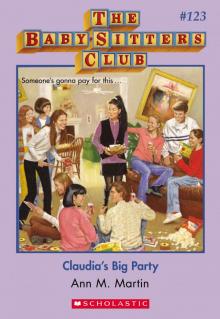 Claudia's Big Party
Claudia's Big Party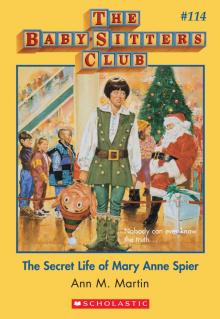 The Secret Life of Mary Anne Spier
The Secret Life of Mary Anne Spier Karen's Book
Karen's Book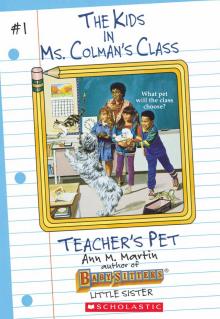 Teacher's Pet
Teacher's Pet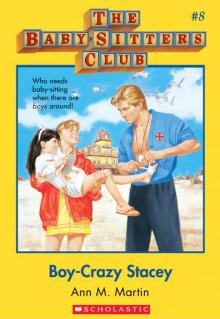 Boy-Crazy Stacey
Boy-Crazy Stacey Claudia and the Disaster Date
Claudia and the Disaster Date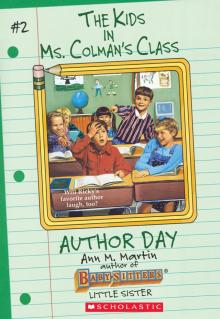 Author Day
Author Day Claudia and the Sad Good-Bye
Claudia and the Sad Good-Bye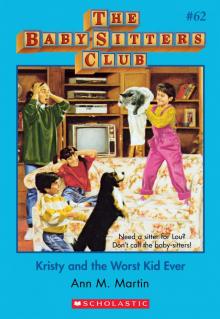 Kristy and the Worst Kid Ever
Kristy and the Worst Kid Ever Yours Turly, Shirley
Yours Turly, Shirley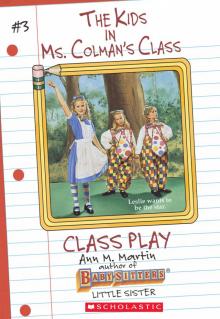 Class Play
Class Play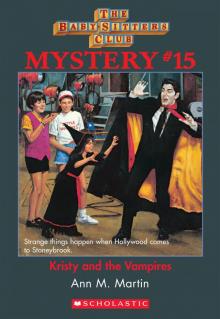 Kristy and the Vampires
Kristy and the Vampires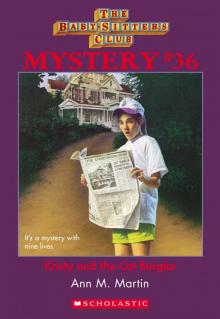 Kristy and the Cat Burglar
Kristy and the Cat Burglar Karen's Pumpkin Patch
Karen's Pumpkin Patch Stacey and the Mystery at the Empty House
Stacey and the Mystery at the Empty House Karen's Chicken Pox
Karen's Chicken Pox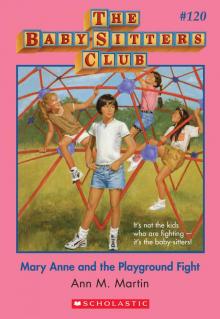 Mary Anne and the Playground Fight
Mary Anne and the Playground Fight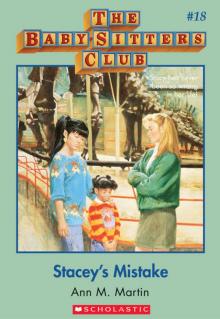 Stacey's Mistake
Stacey's Mistake Coming Apart
Coming Apart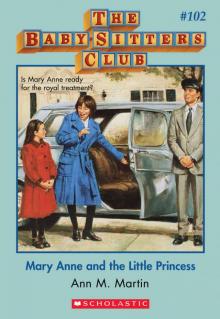 Mary Anne and the Little Princess
Mary Anne and the Little Princess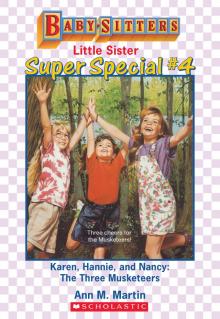 Karen, Hannie and Nancy: The Three Musketeers
Karen, Hannie and Nancy: The Three Musketeers 'Tis the Season
'Tis the Season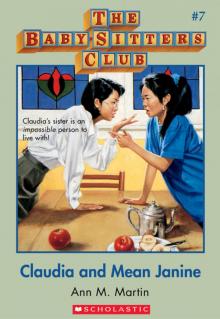 Claudia and Mean Janine
Claudia and Mean Janine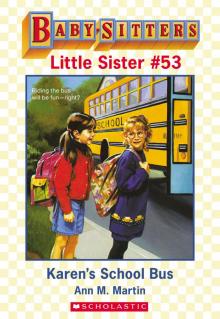 Karen's School Bus
Karen's School Bus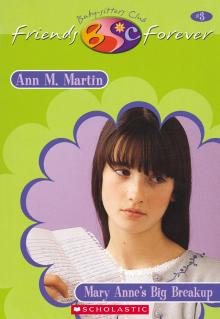 Mary Anne's Big Breakup
Mary Anne's Big Breakup Rain Reign
Rain Reign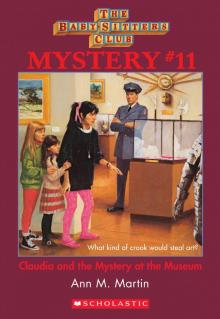 Claudia and the Mystery at the Museum
Claudia and the Mystery at the Museum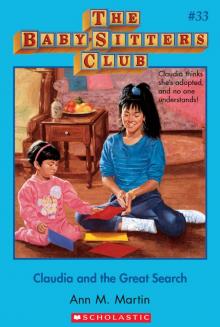 Claudia and the Great Search
Claudia and the Great Search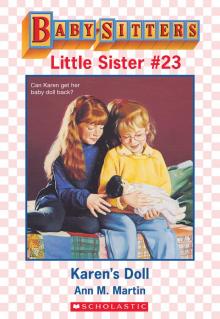 Karen's Doll
Karen's Doll Shannon's Story
Shannon's Story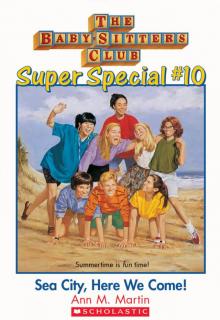 Sea City, Here We Come!
Sea City, Here We Come!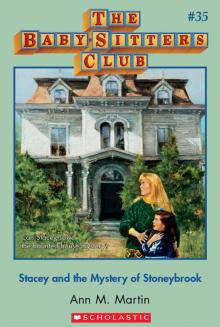 Stacey and the Mystery of Stoneybrook
Stacey and the Mystery of Stoneybrook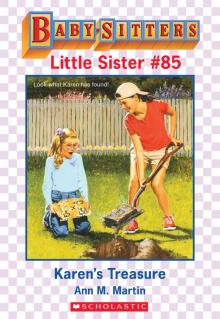 Karen's Treasure
Karen's Treasure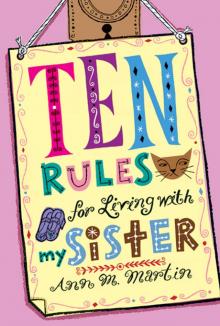 Ten Rules for Living With My Sister
Ten Rules for Living With My Sister With You and Without You
With You and Without You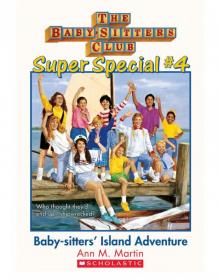 Baby-Sitters' Island Adventure
Baby-Sitters' Island Adventure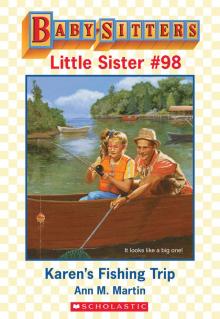 Karen's Fishing Trip
Karen's Fishing Trip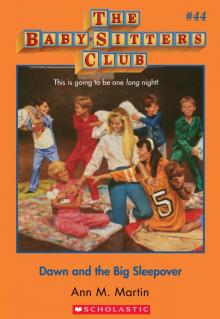 Dawn and the Big Sleepover
Dawn and the Big Sleepover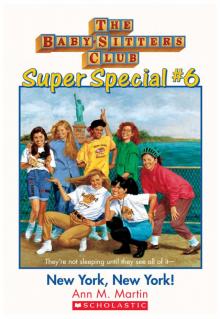 New York, New York!
New York, New York! Ten Kids, No Pets
Ten Kids, No Pets Happy Holidays, Jessi
Happy Holidays, Jessi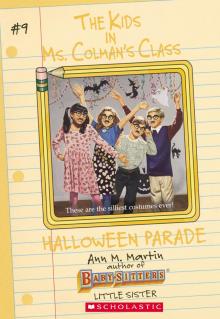 Halloween Parade
Halloween Parade Karen's New Holiday
Karen's New Holiday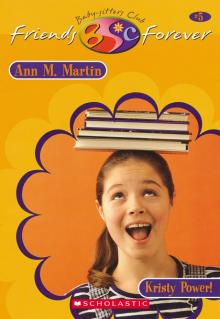 Kristy Power!
Kristy Power! Karen's Wish
Karen's Wish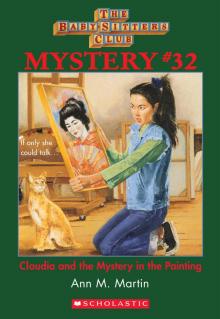 Claudia and the Mystery in the Painting
Claudia and the Mystery in the Painting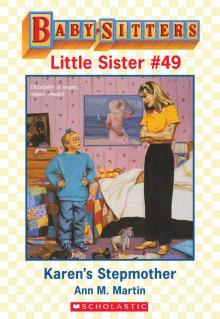 Karen's Stepmother
Karen's Stepmother Abby in Wonderland
Abby in Wonderland Karen's Snow Day
Karen's Snow Day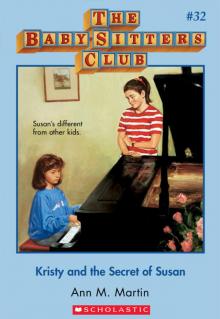 Kristy and the Secret of Susan
Kristy and the Secret of Susan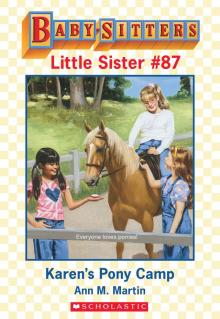 Karen's Pony Camp
Karen's Pony Camp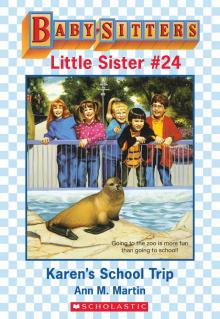 Karen's School Trip
Karen's School Trip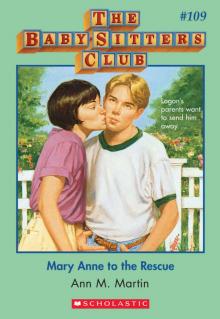 Mary Anne to the Rescue
Mary Anne to the Rescue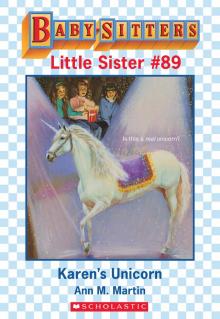 Karen's Unicorn
Karen's Unicorn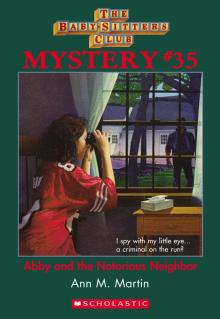 Abby and the Notorious Neighbor
Abby and the Notorious Neighbor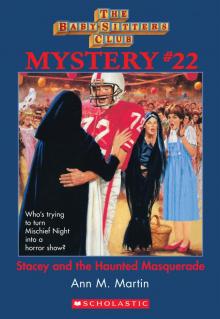 Stacey and the Haunted Masquerade
Stacey and the Haunted Masquerade Claudia Gets Her Guy
Claudia Gets Her Guy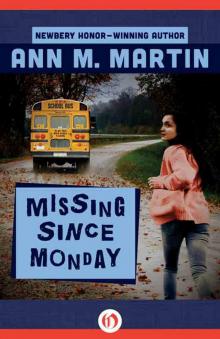 Missing Since Monday
Missing Since Monday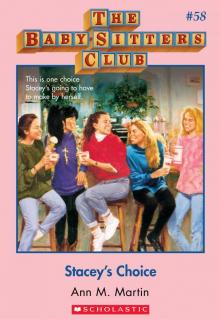 Stacey's Choice
Stacey's Choice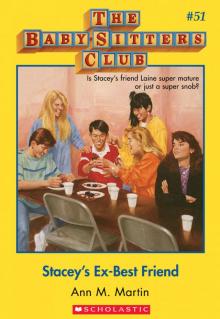 Stacey's Ex-Best Friend
Stacey's Ex-Best Friend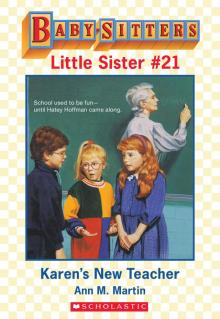 Karen's New Teacher
Karen's New Teacher Karen's Accident
Karen's Accident Karen's Lucky Penny
Karen's Lucky Penny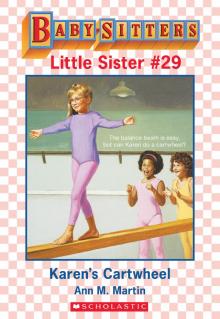 Karen's Cartwheel
Karen's Cartwheel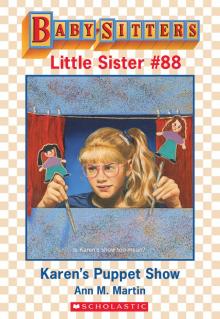 Karen's Puppet Show
Karen's Puppet Show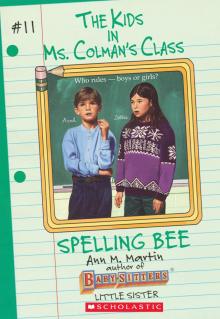 Spelling Bee
Spelling Bee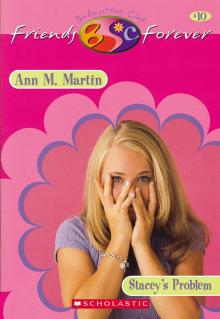 Stacey's Problem
Stacey's Problem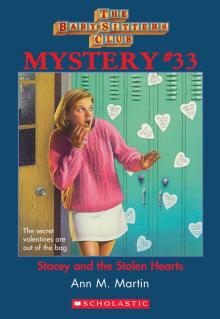 Stacey and the Stolen Hearts
Stacey and the Stolen Hearts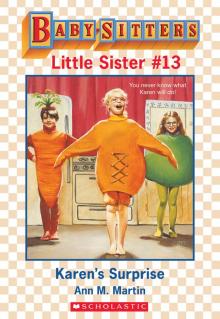 Karen's Surprise
Karen's Surprise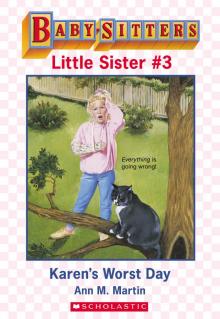 Karen's Worst Day
Karen's Worst Day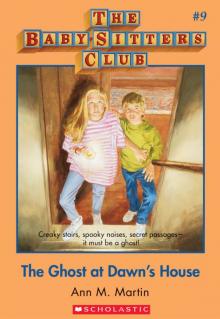 The Ghost at Dawn's House
The Ghost at Dawn's House Karen's Big Sister
Karen's Big Sister Karen's Easter Parade
Karen's Easter Parade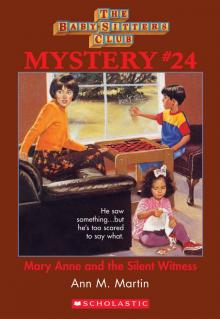 Mary Anne and the Silent Witness
Mary Anne and the Silent Witness Karen's Swim Meet
Karen's Swim Meet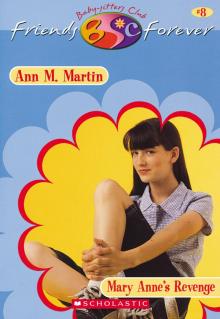 Mary Anne's Revenge
Mary Anne's Revenge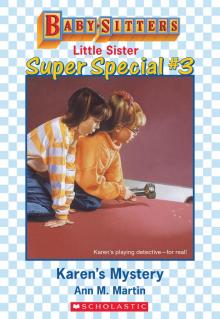 Karen's Mystery
Karen's Mystery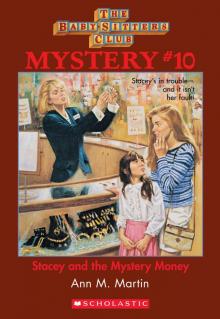 Stacey and the Mystery Money
Stacey and the Mystery Money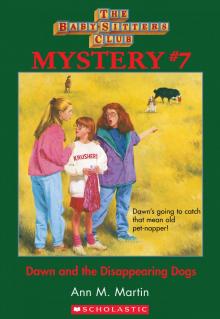 Dawn and the Disappearing Dogs
Dawn and the Disappearing Dogs Karen's Christmas Tree
Karen's Christmas Tree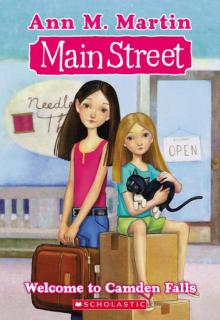 Welcome to Camden Falls
Welcome to Camden Falls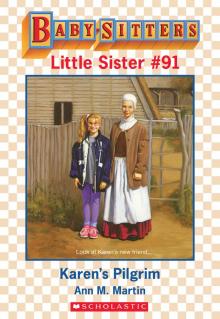 Karen's Pilgrim
Karen's Pilgrim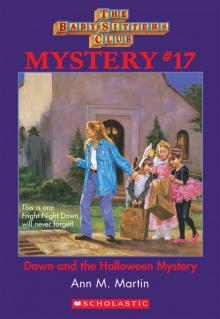 Dawn and the Halloween Mystery
Dawn and the Halloween Mystery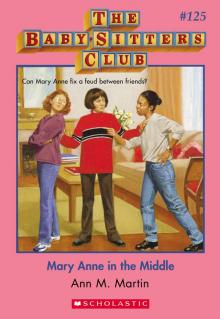 Mary Anne in the Middle
Mary Anne in the Middle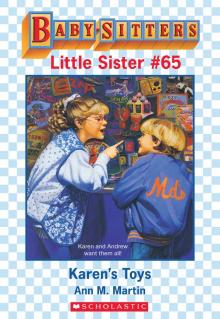 Karen's Toys
Karen's Toys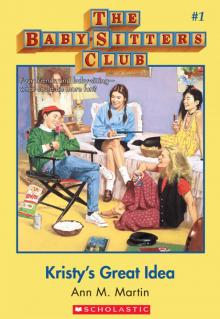 Kristy's Great Idea
Kristy's Great Idea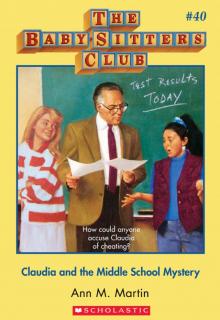 Claudia and the Middle School Mystery
Claudia and the Middle School Mystery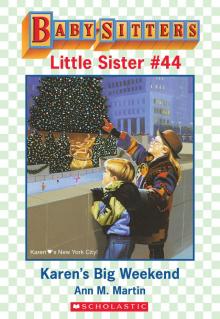 Karen's Big Weekend
Karen's Big Weekend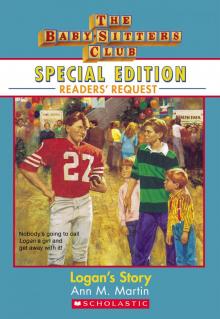 Logan's Story
Logan's Story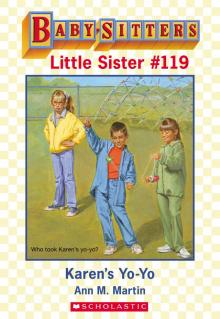 Karen's Yo-Yo
Karen's Yo-Yo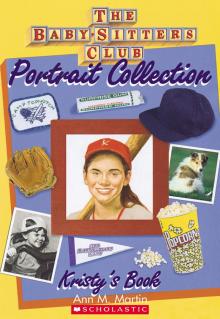 Kristy's Book
Kristy's Book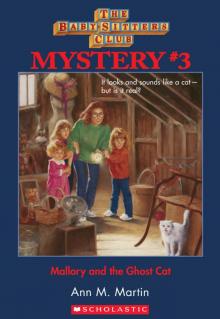 Mallory and the Ghost Cat
Mallory and the Ghost Cat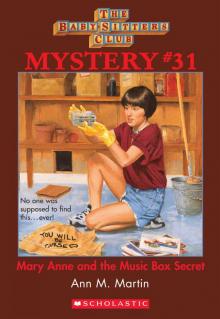 Mary Anne and the Music
Mary Anne and the Music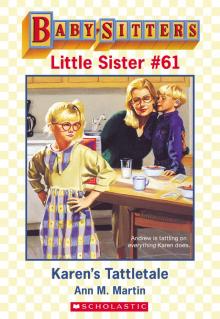 Karen's Tattletale
Karen's Tattletale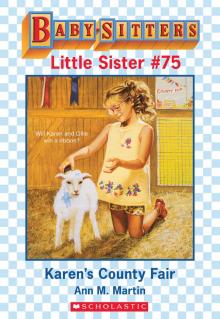 Karen's County Fair
Karen's County Fair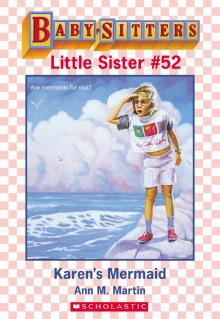 Karen's Mermaid
Karen's Mermaid Snowbound
Snowbound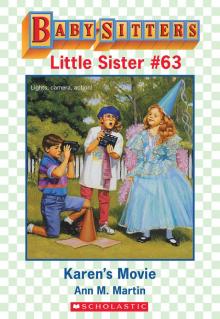 Karen's Movie
Karen's Movie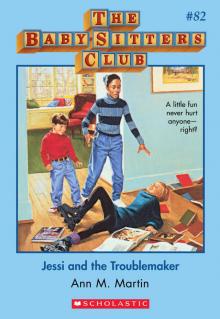 Jessi and the Troublemaker
Jessi and the Troublemaker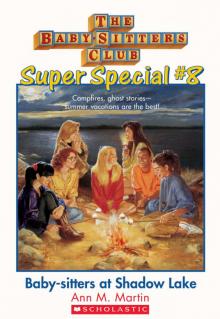 Baby-Sitters at Shadow Lake
Baby-Sitters at Shadow Lake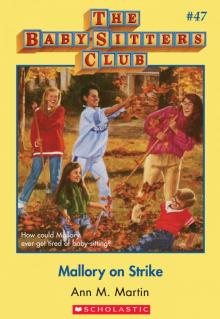 Mallory on Strike
Mallory on Strike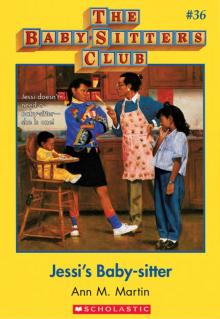 Jessi's Baby-Sitter
Jessi's Baby-Sitter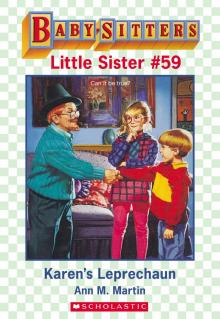 Karen's Leprechaun
Karen's Leprechaun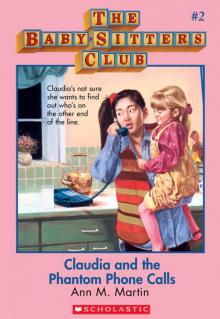 Claudia and the Phantom Phone Calls
Claudia and the Phantom Phone Calls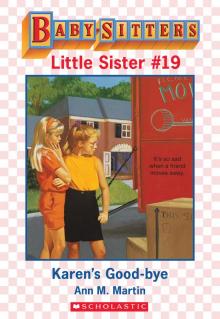 Karen's Good-Bye
Karen's Good-Bye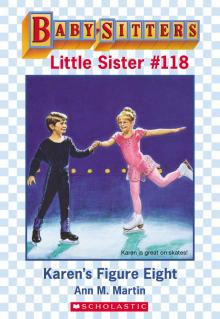 Karen's Figure Eight
Karen's Figure Eight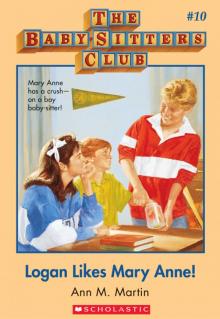 Logan Likes Mary Anne!
Logan Likes Mary Anne!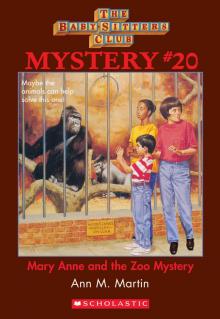 Mary Anne and the Zoo Mystery
Mary Anne and the Zoo Mystery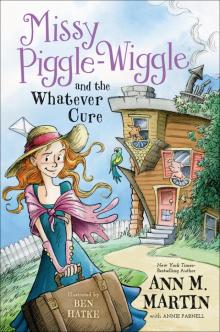 Missy Piggle-Wiggle and the Whatever Cure
Missy Piggle-Wiggle and the Whatever Cure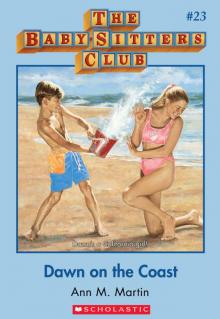 Dawn on the Coast
Dawn on the Coast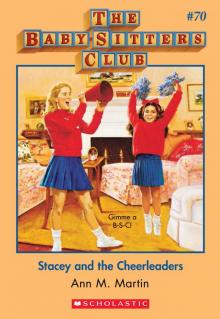 Stacey and the Cheerleaders
Stacey and the Cheerleaders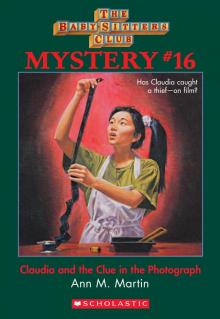 Claudia and the Clue in the Photograph
Claudia and the Clue in the Photograph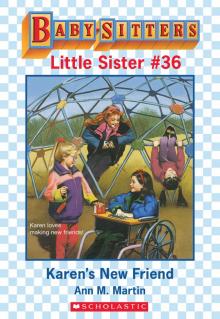 Karen's New Friend
Karen's New Friend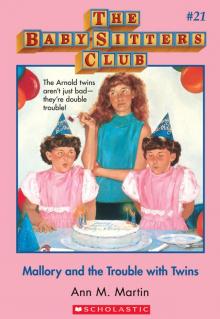 Mallory and the Trouble With Twins
Mallory and the Trouble With Twins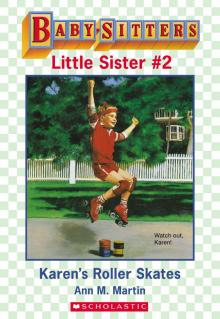 Karen's Roller Skates
Karen's Roller Skates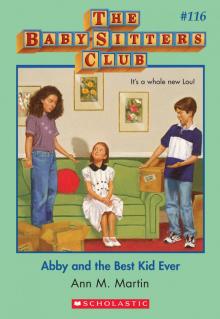 Abby and the Best Kid Ever
Abby and the Best Kid Ever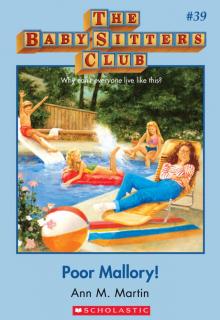 Poor Mallory!
Poor Mallory!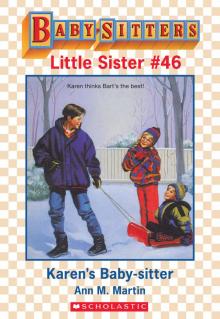 Karen's Witch
Karen's Witch Karen's Grandmothers
Karen's Grandmothers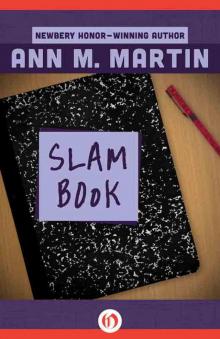 Slam Book
Slam Book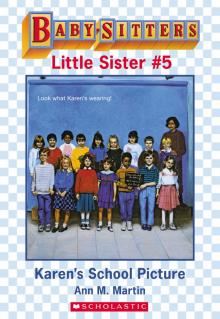 Karen's School Picture
Karen's School Picture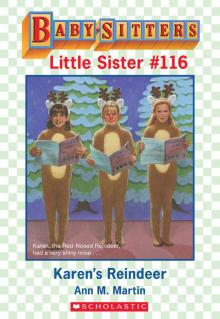 Karen's Reindeer
Karen's Reindeer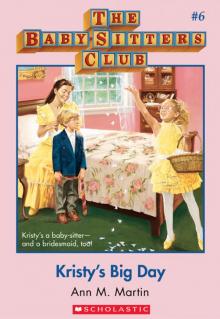 Kristy's Big Day
Kristy's Big Day The Long Way Home
The Long Way Home Karen's Sleigh Ride
Karen's Sleigh Ride On Christmas Eve
On Christmas Eve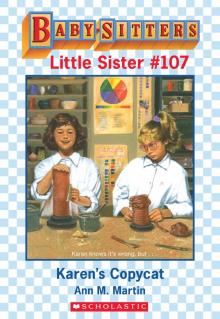 Karen's Copycat
Karen's Copycat Karen's Ice Skates
Karen's Ice Skates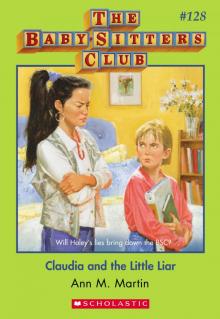 Claudia and the Little Liar
Claudia and the Little Liar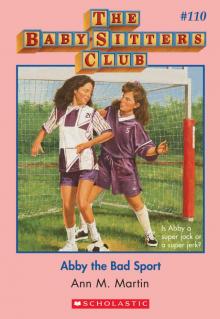 Abby the Bad Sport
Abby the Bad Sport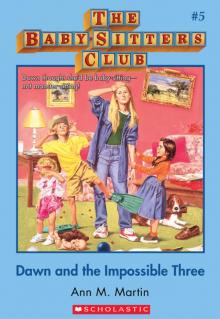 The Baby-Sitters Club #5: Dawn and the Impossible Three
The Baby-Sitters Club #5: Dawn and the Impossible Three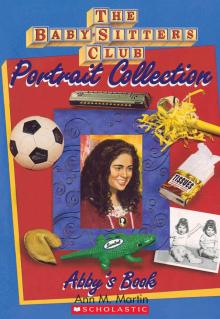 Abby's Book
Abby's Book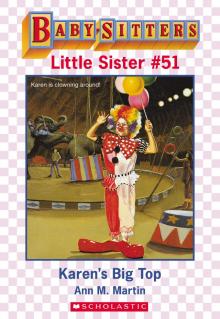 Karen's Big Top
Karen's Big Top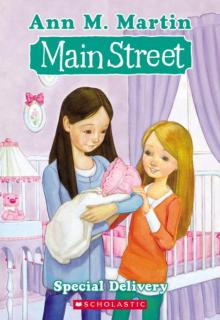 Main Street #8: Special Delivery
Main Street #8: Special Delivery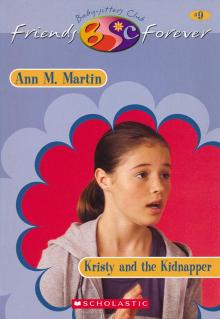 Kristy and the Kidnapper
Kristy and the Kidnapper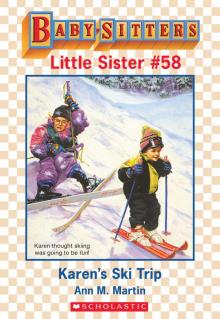 Karen's Ski Trip
Karen's Ski Trip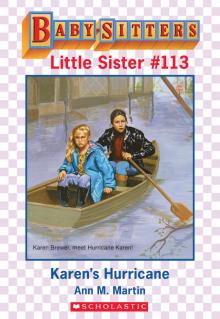 Karen's Hurricane
Karen's Hurricane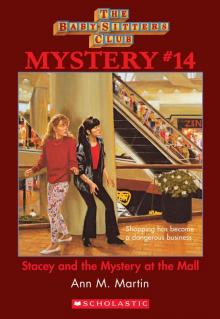 Stacey and the Mystery at the Mall
Stacey and the Mystery at the Mall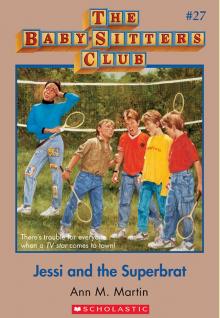 Jessi and the Superbrat
Jessi and the Superbrat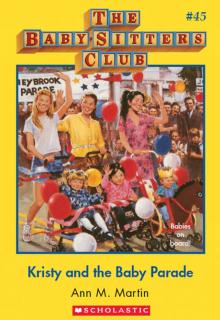 Kristy and the Baby Parade
Kristy and the Baby Parade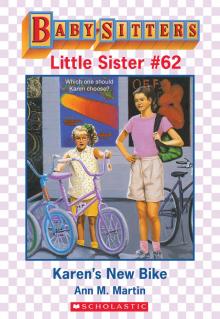 Karen's New Bike
Karen's New Bike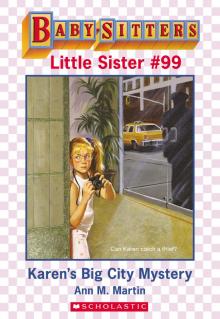 Karen's Big City Mystery
Karen's Big City Mystery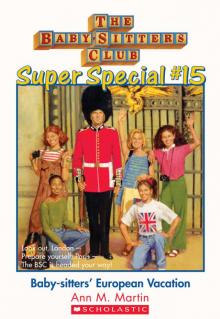 Baby-Sitters' European Vacation
Baby-Sitters' European Vacation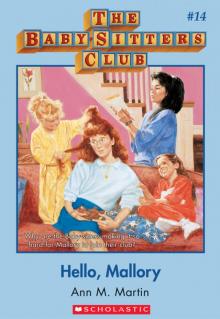 Hello, Mallory
Hello, Mallory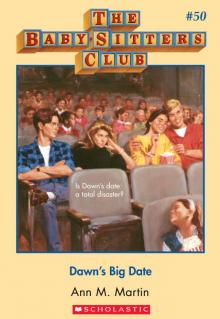 Dawn's Big Date
Dawn's Big Date Karen's Christmas Carol
Karen's Christmas Carol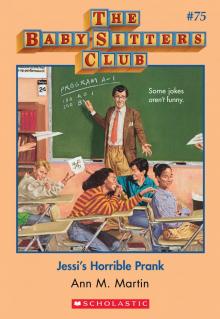 Jessi's Horrible Prank
Jessi's Horrible Prank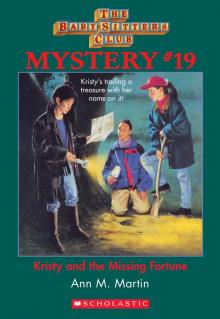 Kristy and the Missing Fortune
Kristy and the Missing Fortune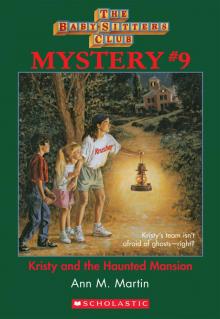 Kristy and the Haunted Mansion
Kristy and the Haunted Mansion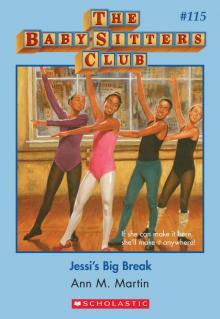 Jessi's Big Break
Jessi's Big Break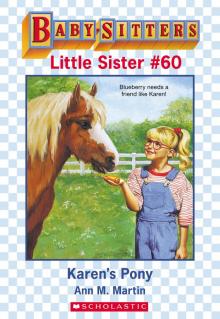 Karen's Pony
Karen's Pony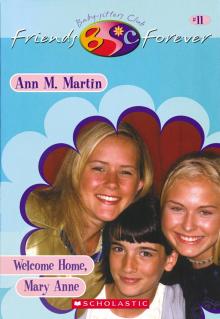 Welcome Home, Mary Anne
Welcome Home, Mary Anne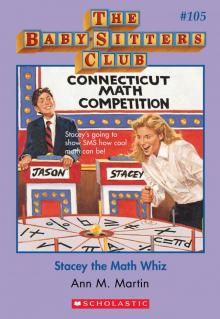 Stacey the Math Whiz
Stacey the Math Whiz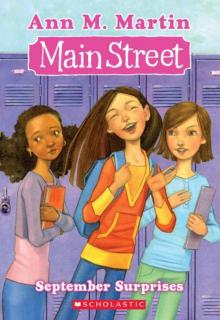 September Surprises
September Surprises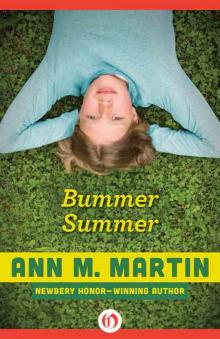 Bummer Summer
Bummer Summer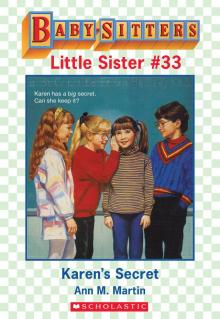 Karen's Secret
Karen's Secret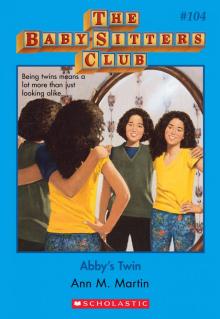 Abby's Twin
Abby's Twin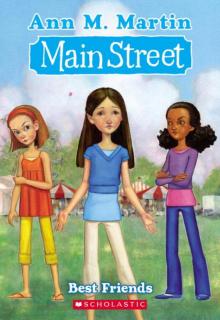 Main Street #4: Best Friends
Main Street #4: Best Friends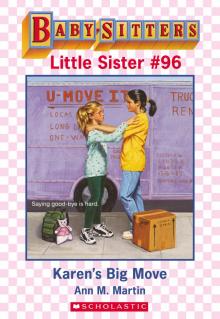 Karen's Big Move
Karen's Big Move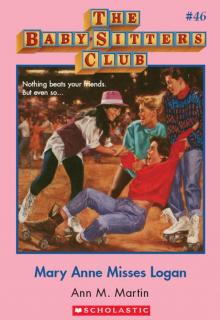 Mary Anne Misses Logan
Mary Anne Misses Logan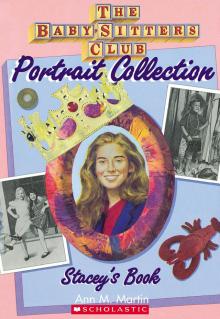 Stacey's Book
Stacey's Book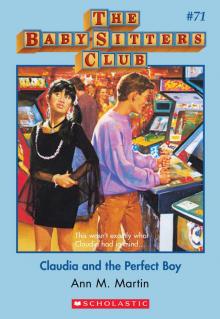 Claudia and the Perfect Boy
Claudia and the Perfect Boy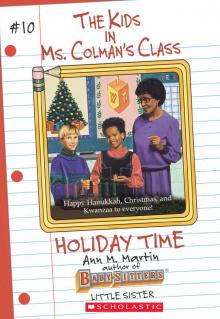 Holiday Time
Holiday Time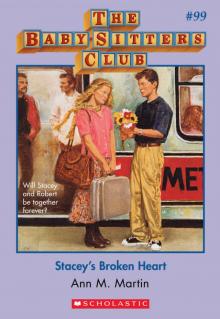 Stacey's Broken Heart
Stacey's Broken Heart Karen's Field Day
Karen's Field Day Kristy's Worst Idea
Kristy's Worst Idea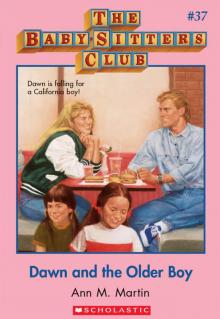 Dawn and the Older Boy
Dawn and the Older Boy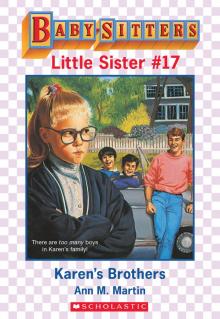 Karen's Brothers
Karen's Brothers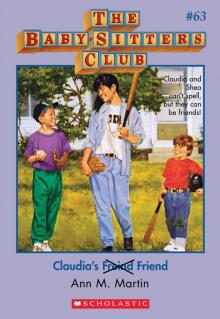 Claudia's Friend
Claudia's Friend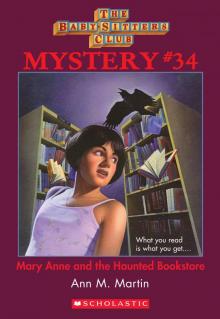 Mary Anne and the Haunted Bookstore
Mary Anne and the Haunted Bookstore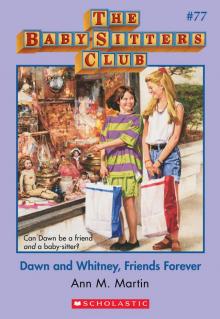 Dawn and Whitney, Friends Forever
Dawn and Whitney, Friends Forever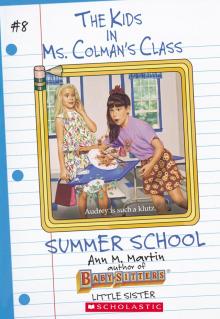 Summer School
Summer School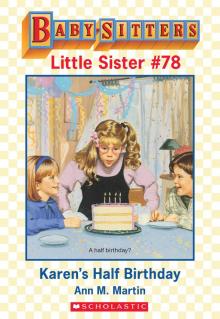 Karen's Birthday
Karen's Birthday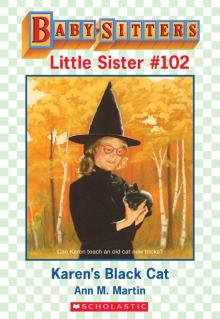 Karen's Black Cat
Karen's Black Cat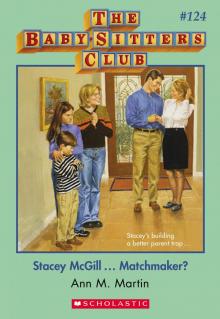 Stacey McGill... Matchmaker?
Stacey McGill... Matchmaker?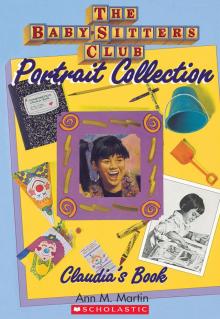 Claudia's Book
Claudia's Book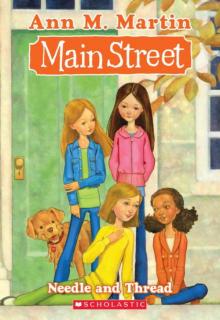 Main Street #2: Needle and Thread
Main Street #2: Needle and Thread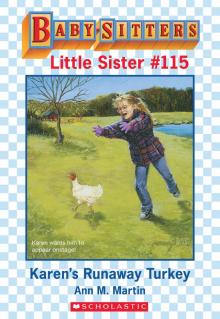 Karen's Runaway Turkey
Karen's Runaway Turkey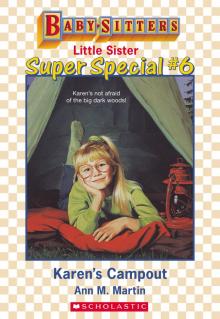 Karen's Campout
Karen's Campout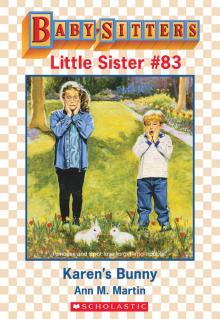 Karen's Bunny
Karen's Bunny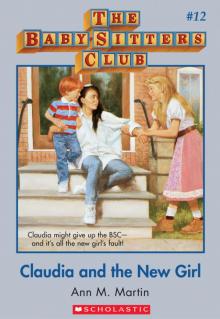 Claudia and the New Girl
Claudia and the New Girl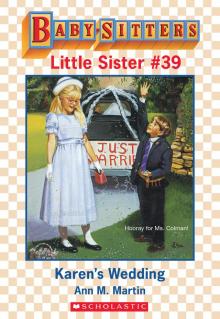 Karen's Wedding
Karen's Wedding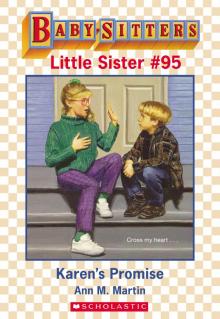 Karen's Promise
Karen's Promise Karen's Snow Princess
Karen's Snow Princess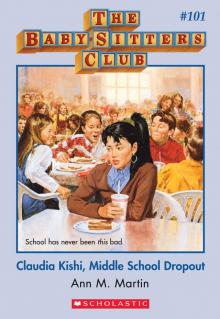 Claudia Kishi, Middle School Dropout
Claudia Kishi, Middle School Dropout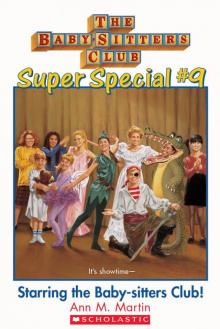 Starring the Baby-Sitters Club!
Starring the Baby-Sitters Club!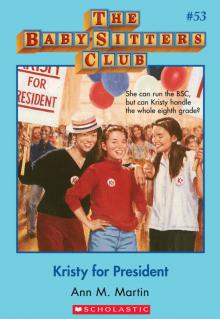 Kristy for President
Kristy for President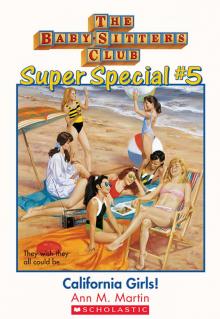 California Girls!
California Girls!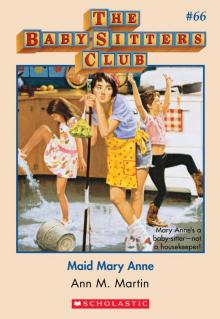 Maid Mary Anne
Maid Mary Anne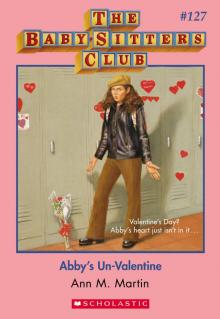 Abby's Un-Valentine
Abby's Un-Valentine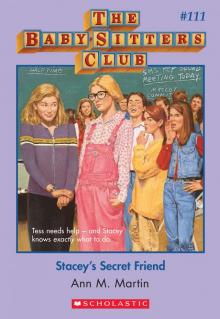 Stacey's Secret Friend
Stacey's Secret Friend Karen's Haunted House
Karen's Haunted House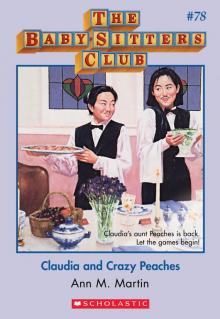 Claudia and Crazy Peaches
Claudia and Crazy Peaches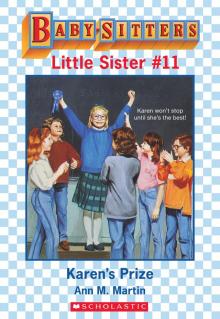 Karen's Prize
Karen's Prize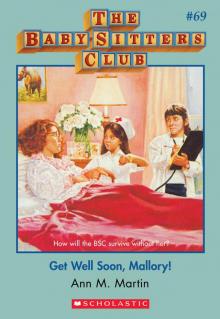 Get Well Soon, Mallory!
Get Well Soon, Mallory!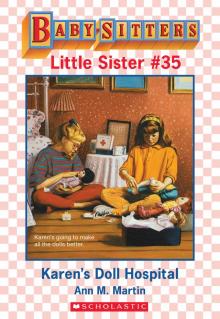 Karen's Doll Hospital
Karen's Doll Hospital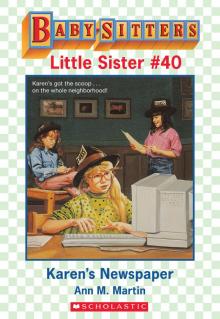 Karen's Newspaper
Karen's Newspaper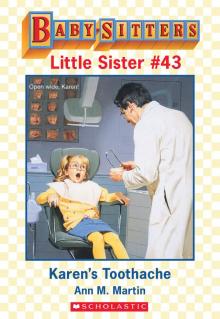 Karen's Toothache
Karen's Toothache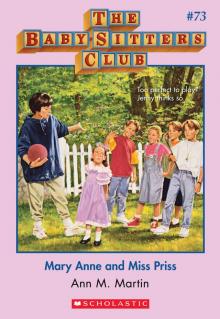 Mary Anne and Miss Priss
Mary Anne and Miss Priss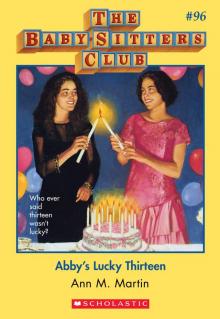 Abby's Lucky Thirteen
Abby's Lucky Thirteen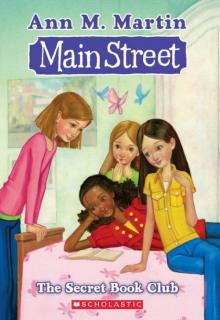 The Secret Book Club
The Secret Book Club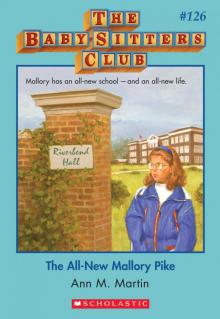 The All-New Mallory Pike
The All-New Mallory Pike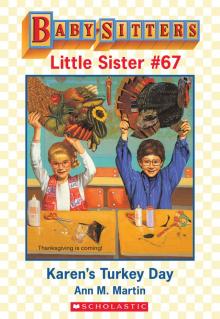 Karen's Turkey Day
Karen's Turkey Day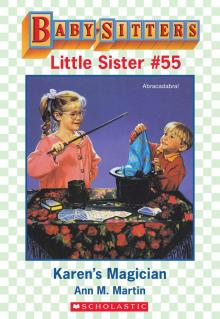 Karen's Magician
Karen's Magician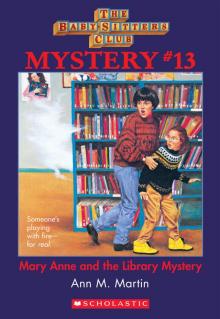 Mary Anne and the Library Mystery
Mary Anne and the Library Mystery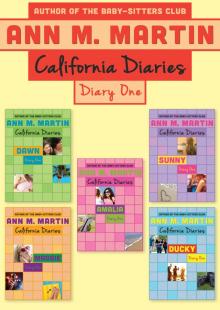 Diary One: Dawn, Sunny, Maggie, Amalia, and Ducky
Diary One: Dawn, Sunny, Maggie, Amalia, and Ducky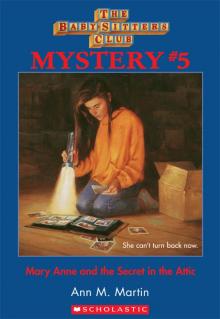 Mary Anne and the Secret in the Attic
Mary Anne and the Secret in the Attic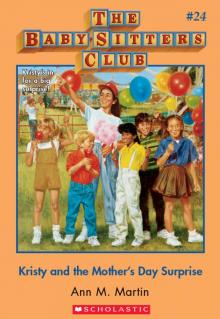 Kristy and the Mother's Day Surprise
Kristy and the Mother's Day Surprise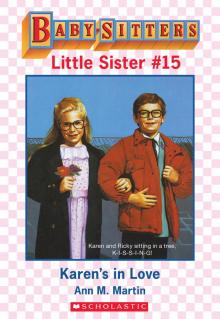 Karen's in Love
Karen's in Love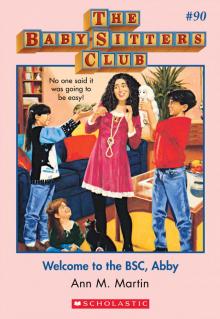 Welcome to the BSC, Abby
Welcome to the BSC, Abby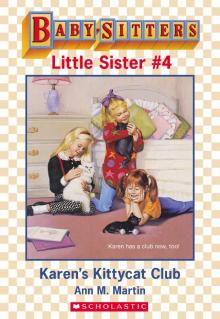 Karen's Kittycat Club
Karen's Kittycat Club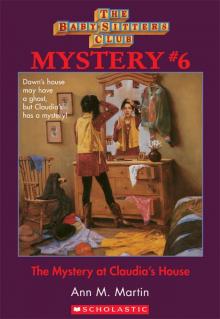 The Mystery at Claudia's House
The Mystery at Claudia's House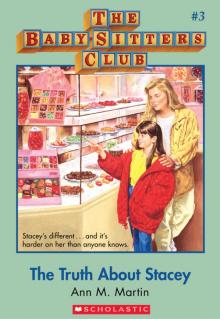 The Truth About Stacey
The Truth About Stacey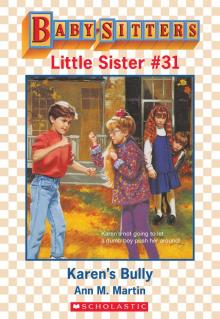 Karen's Bully
Karen's Bully Karen's Gift
Karen's Gift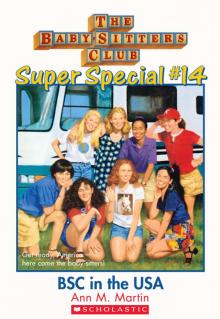 BSC in the USA
BSC in the USA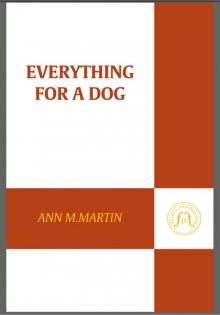 Everything for a Dog
Everything for a Dog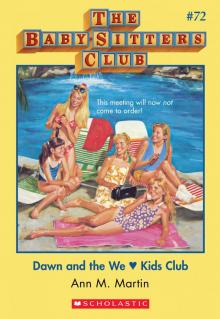 Dawn and the We Love Kids Club
Dawn and the We Love Kids Club Karen's Ghost
Karen's Ghost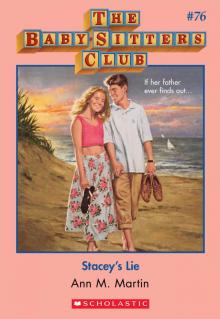 Stacey's Lie
Stacey's Lie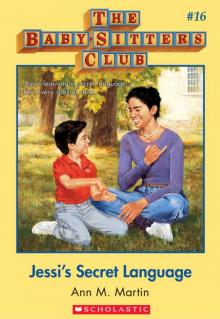 Jessi's Secret Language
Jessi's Secret Language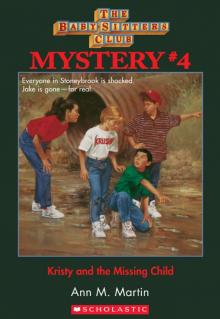 Kristy and the Missing Child
Kristy and the Missing Child Better to Wish
Better to Wish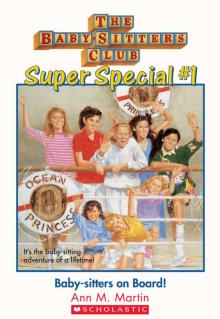 Baby-Sitters on Board!
Baby-Sitters on Board!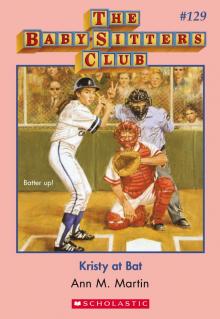 Kristy at Bat
Kristy at Bat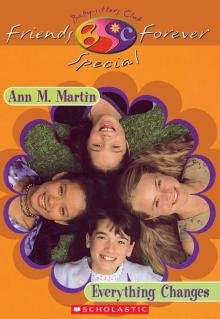 Everything Changes
Everything Changes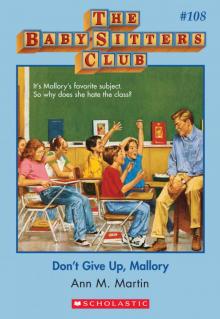 Don't Give Up, Mallory
Don't Give Up, Mallory A Dog's Life: The Autobiography of a Stray
A Dog's Life: The Autobiography of a Stray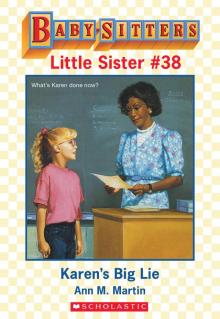 Karen's Big Lie
Karen's Big Lie Karen's Show and Share
Karen's Show and Share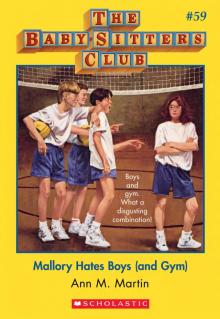 Mallory Hates Boys (and Gym)
Mallory Hates Boys (and Gym)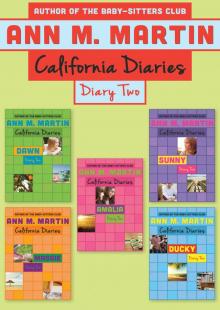 Diary Two: Dawn, Sunny, Maggie, Amalia, and Ducky
Diary Two: Dawn, Sunny, Maggie, Amalia, and Ducky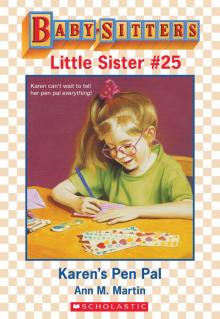 Karen's Pen Pal
Karen's Pen Pal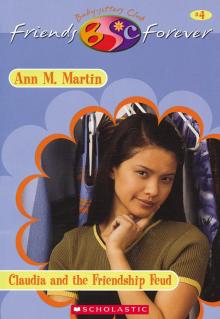 Claudia and the Friendship Feud
Claudia and the Friendship Feud Karen's Secret Valentine
Karen's Secret Valentine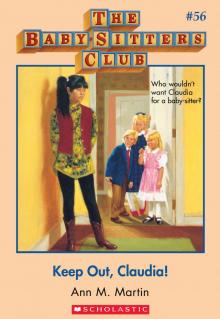 Keep Out, Claudia!
Keep Out, Claudia! Aloha, Baby-Sitters!
Aloha, Baby-Sitters!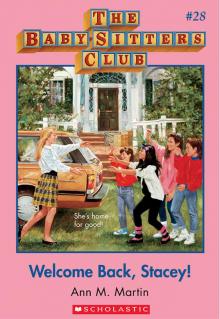 Welcome Back, Stacey
Welcome Back, Stacey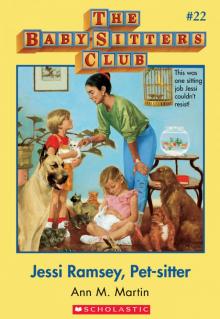 Jessi Ramsey, Pet-Sitter
Jessi Ramsey, Pet-Sitter Karen's Pizza Party
Karen's Pizza Party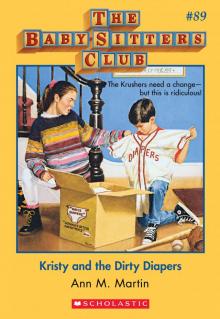 Kristy and the Dirty Diapers
Kristy and the Dirty Diapers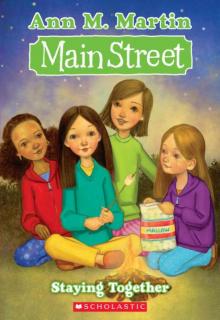 Staying Together
Staying Together Dawn and the Surfer Ghost
Dawn and the Surfer Ghost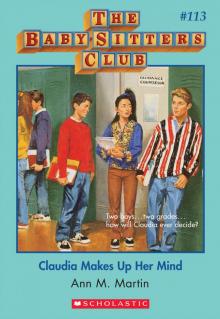 Claudia Makes Up Her Mind
Claudia Makes Up Her Mind Jessi's Gold Medal
Jessi's Gold Medal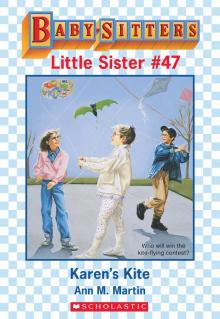 Karen's Kite
Karen's Kite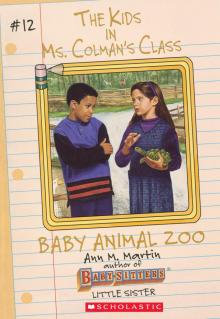 Baby Animal Zoo
Baby Animal Zoo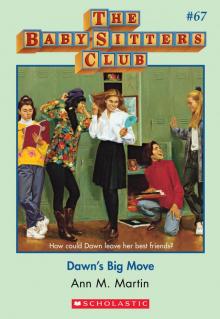 Dawn's Big Move
Dawn's Big Move Karen's Big Joke
Karen's Big Joke Karen's Lemonade Stand
Karen's Lemonade Stand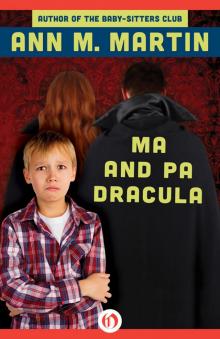 Ma and Pa Dracula
Ma and Pa Dracula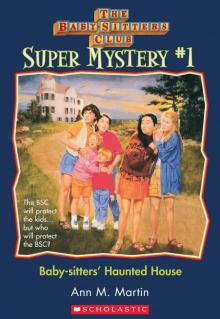 Baby-Sitters' Haunted House
Baby-Sitters' Haunted House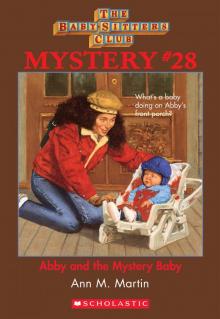 Abby and the Mystery Baby
Abby and the Mystery Baby Home Is the Place
Home Is the Place Karen's Grandad
Karen's Grandad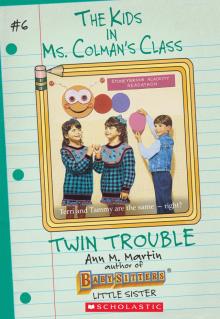 Twin Trouble
Twin Trouble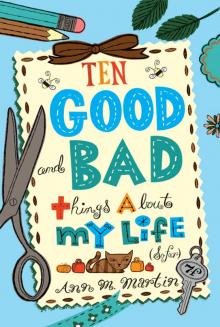 Ten Good and Bad Things About My Life (So Far)
Ten Good and Bad Things About My Life (So Far)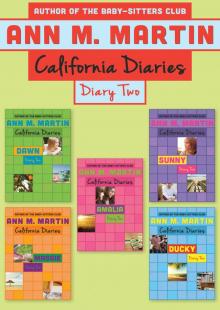 Diary Two
Diary Two Baby-Sitters Club 027
Baby-Sitters Club 027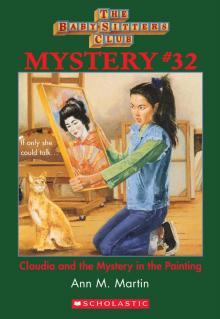 Claudia and the Mystery Painting
Claudia and the Mystery Painting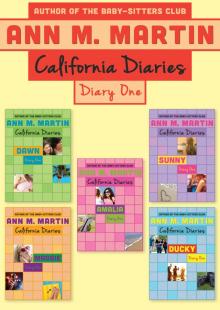 Diary One
Diary One Baby-Sitters Club 037
Baby-Sitters Club 037 Baby-Sitters Club 028
Baby-Sitters Club 028 Baby-Sitters Club 085
Baby-Sitters Club 085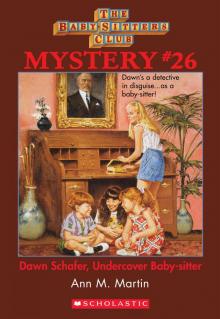 Dawn Schaffer Undercover Baby-Sitter
Dawn Schaffer Undercover Baby-Sitter Jessi's Babysitter
Jessi's Babysitter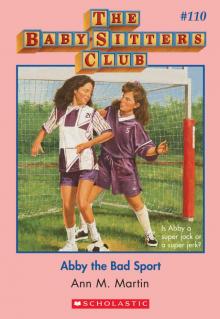 The Baby-Sitters Club #110: Abby the Bad Sport (Baby-Sitters Club, The)
The Baby-Sitters Club #110: Abby the Bad Sport (Baby-Sitters Club, The) Karen's Little Sister
Karen's Little Sister Baby-Sitters Club 058
Baby-Sitters Club 058 Claudia And The Genius On Elm St.
Claudia And The Genius On Elm St. Missy Piggle-Wiggle and the Sticky-Fingers Cure
Missy Piggle-Wiggle and the Sticky-Fingers Cure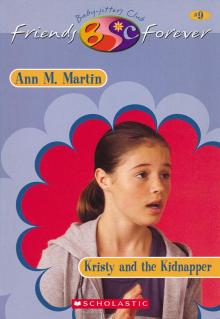 Kristy and Kidnapper
Kristy and Kidnapper Baby-Sitters Club 041
Baby-Sitters Club 041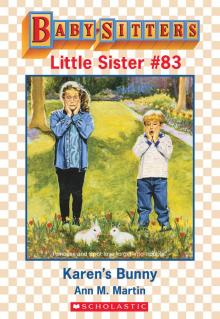 Karen's Bunny Trouble
Karen's Bunny Trouble Baby-Sitters Club 032
Baby-Sitters Club 032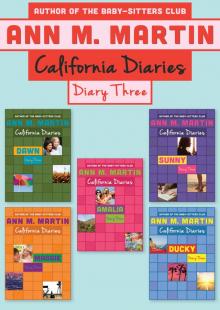 Diary Three
Diary Three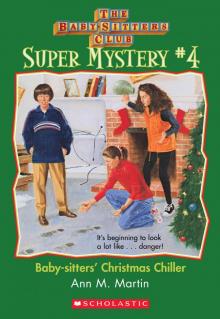 Christmas Chiller
Christmas Chiller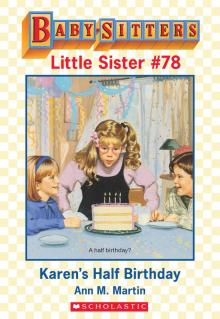 Karen's Half-Birthday
Karen's Half-Birthday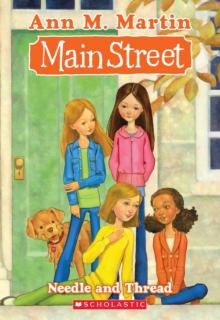 Needle and Thread
Needle and Thread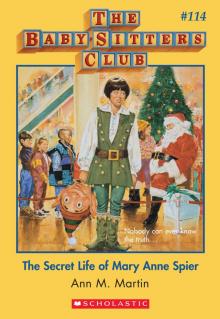 Secret Life of Mary Anne Spier
Secret Life of Mary Anne Spier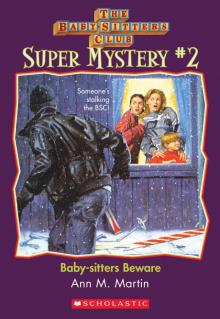 Baby-Sitters Beware
Baby-Sitters Beware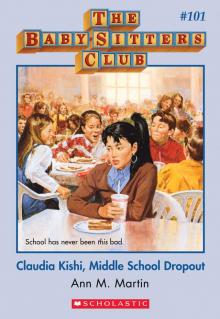 Claudia Kishi, Middle School Drop-Out
Claudia Kishi, Middle School Drop-Out Logan Likes Mary Anne !
Logan Likes Mary Anne ! Baby-Sitters Club 061
Baby-Sitters Club 061 Best Friends
Best Friends Baby-Sitters Club 031
Baby-Sitters Club 031 Karen's Little Witch
Karen's Little Witch Jessi Ramsey, Petsitter
Jessi Ramsey, Petsitter Baby-Sitters Club 123
Baby-Sitters Club 123 Baby-Sitters Club 059
Baby-Sitters Club 059 Baby-Sitters Club 033
Baby-Sitters Club 033 Baby-Sitters Club 060
Baby-Sitters Club 060 Baby-Sitters Club 094
Baby-Sitters Club 094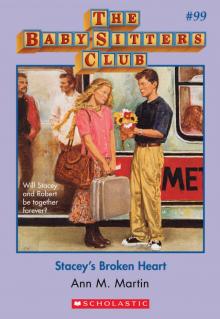 The Baby-Sitters Club #99: Stacey's Broken Heart
The Baby-Sitters Club #99: Stacey's Broken Heart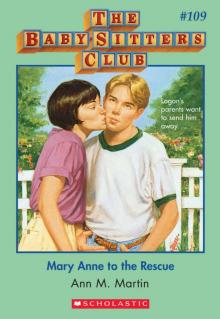 The Baby-Sitters Club #109: Mary Anne to the Rescue (Baby-Sitters Club, The)
The Baby-Sitters Club #109: Mary Anne to the Rescue (Baby-Sitters Club, The) Mystery At Claudia's House
Mystery At Claudia's House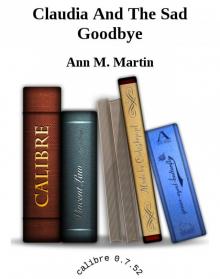 Claudia And The Sad Goodbye
Claudia And The Sad Goodbye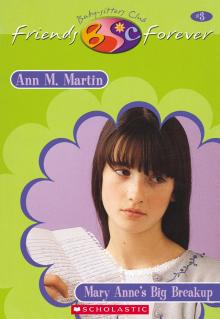 Mary Anne's Big Break-Up
Mary Anne's Big Break-Up Baby-Sitters Club 025
Baby-Sitters Club 025 Baby-Sitters Club 042
Baby-Sitters Club 042 Stacey and the Mystery of the Empty House
Stacey and the Mystery of the Empty House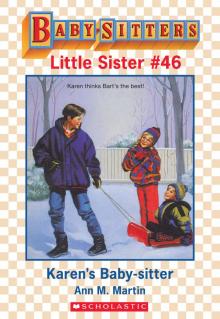 Karen's Baby-Sitter
Karen's Baby-Sitter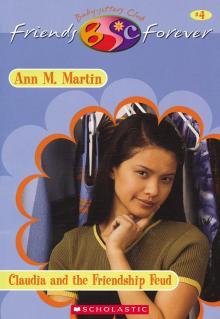 Claudia's Friendship Feud
Claudia's Friendship Feud Baby-Sitters Club 090
Baby-Sitters Club 090 Baby-Sitters Club 021
Baby-Sitters Club 021 Baby-Sitters Club 056
Baby-Sitters Club 056 Baby-Sitters Club 040
Baby-Sitters Club 040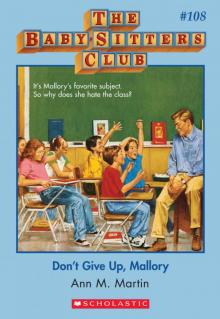 The Baby-Sitters Club #108: Don't Give Up, Mallory (Baby-Sitters Club, The)
The Baby-Sitters Club #108: Don't Give Up, Mallory (Baby-Sitters Club, The)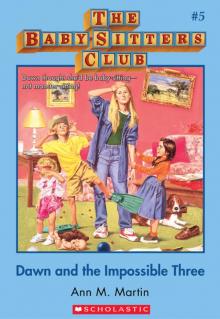 Dawn and the Impossible Three
Dawn and the Impossible Three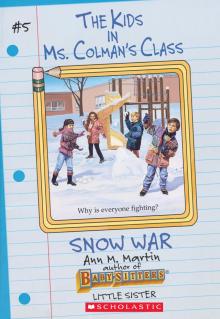 The Snow War
The Snow War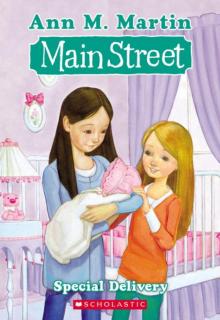 Special Delivery
Special Delivery Baby-Sitters Club 057
Baby-Sitters Club 057 Mary Anne And Too Many Babies
Mary Anne And Too Many Babies Baby-Sitters Club 030
Baby-Sitters Club 030